#at the same time i agree with the idea of them each representing a source dragon and dont know how else theyd substitute kai
Text
of lawsuits & cpns. 💕
just a disclaimer that i understand lawsuits are never a good thing for them. it’s long, tedious and expensive. also, most passer by don’t care and if they see the defamatory remarks, that will stick no matter how many clarifications are done or lawsuits won.

so on 1/15 yuehua released the developments of the lawsuits they filed and one of them is a big name fan of xz. and today, 1/19 xz’s law firm representative did the same and you can see a fan of wyb is there too. these so-called fans both slandered the other, so they are well within their rights to sue. even if most fans’ excuse is that they are “defending” their idol by being an absolute horrible & toxic person. not to mention, they are influencing their followers to do the same which can lead to bigger problems. although i have to say, those bnfs have no remorse. some even see it as a badge of honor for protecting their fave that they are being silenced. go figure 🤦♀️
these lawsuits are never about xz versus wyb. it’s them exercising their right to protect their reputation. if anything, it should be a warning to both sides to behave. there is just no universe where these two boys love the idea of their fans being internet criminals. both of them and their studios have communicated multiple times for fans to be civilized. it’s mostly toxic fan culture that feeds it.
now let me go to the cpn side of things, which is how this reminds us of that time they sued the same company. these recent lawsuits did not materialize overnight, i speculate that it’s been some time and both of them have agreed to do something about the slander going on. it’s not a coincidence too that the announcements happened days after the other. there are conversation on how xz’s team appeared to have sued first and then announced later because the statement said they already have the real name identification of the users. in the meantime, wyb’s side said they are still in the process of doing so to properly file it. so hilarious that some sea creatures are saying that xz is avenging them lol. so how did he know that wyb was gonna sue one of his fans? when his (xz) law firm did it first? there is no avenging going on. these two and their teams obviously talked to each other about this and have come to an agreement that they must stop the source of the problem. as they should. 💅🏻💅🏻💅🏻
it’s not only matching clothes, phone case, camera etc — now it’s matching lawsuits 😅😅😅
there is also an angle where cpfs are saying these two don’t sue turtles for slander. you all know some so/os would love for us to be sued because of CPN. but we have safety nets that we implement so as not to mention their real names, but that’s more of protecting them and less of not wanting to be dragged into a lawsuit. interpret that however you want. i’m not saying we can run free and do whatever we want, because if a cpf does something that is warrants legal actions, i will be all for it.
that’s all <3 i hope xz/wyb remains safe, healthy and happy. less of these lawsuits please!
111 notes
·
View notes
Text
A Merfolk's Melody (Part 3)
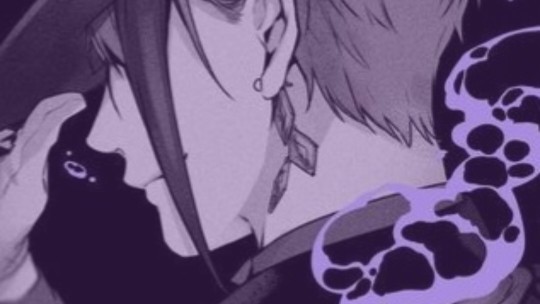
Characters: Yan!Floyd x Reader, Yan!Jade x Reader, Yan!Azul x Reader
Word Count: 13.5k
Intro Floyd Leech Jade Leech (You Are Here) Azul Ashengrotto Epilogue
Synopsis: The sea always calls to those who feel lost and alone, wanting to fill the empty part of their soul until they are loved and full… and as such, it’s only fair that the strange creatures that live beneath its depths would want the same as well…
Author’s Note: Another 4-part fanfiction courtesy of @merakiui ‘s headcanon of the reader being stuck in a room/wall (I’m sorry, but I just enjoy your headcanons and they always give me these ideas) -> https://www.tumblr.com/merakiui/722393818829373440/in-addition-to-being-stuck-in-a-locked-room?source=share & https://www.tumblr.com/merakiui/722677892623056896/about-the-stuck-in-a-wall-trope-in-the-oceani?source=share
Here’s how it’s going to work: each character is going to get their own part following the intro. It is going to focus on the Octrio again (bc it’s my current liking, sorry guys). If you want to read a certain character’s part, feel free to jump around and select the one you’re most interested in.
Again, as stated before, this is a work of fiction; I disagree with any and all behaviors that are represented in this story.
****
During your earlier days in college, you and another of your close friends had once discussed the difference between coral and mushrooms - as there were some fungi corals that lived in the coral reefs, even though they were not classified in the fungi family. You both agreed that fungi and coral played huge parts in their own ecosystems, providing both nutrition and hiding areas for the wildlife that inhabited the area around them. Both were made up of microscopic organisms - as most plants and other wildlife are - but while one shot spores, the other grew polyps on top of each other over time.
Your friend had asked if you knew if there was a coral reef back in your childhood home - to which you responded that you weren’t sure. You had been told by someone once long ago that beyond the crashing waves of the sea outside of your family’s cabin that there were coral structures the size of Burj Khalifa - the world’s tallest building - and a few that were wider than the Aerium - the world’s widest building. Imagining the depth and how big the ocean was already a monstrous task as it is, but the knowledge that some coral was as large and as wide as two of the world’s biggest buildings was mind-blowing.
Now, a few years later as you dipped beneath the surface as the waves pulled you further into its depths, an amazing sight greeted you.
Colorful coral of all shapes, sizes, and types spread before you - elkhorn coral, fungia and pocillopora corals spread along the ocean floor as pillar and staghorn coral reached for the sky. Sun coral and sea anemones waved with the current of the tide while bubble corals and zoanthids peered out from dark crevices. The colors of neon in pink, green, teal, orange, and yellow shifted together with the darkness of the water here and there, making everything seem like a blacklight room from one of the city’s downtown clubs.
But the coral and plants weren't the only thing colorful within the dark waters.
Bright colorful fish of all shapes and sizes surrounded you from all angles - clownfish peered out from behind the sea anemone as the occasional blue or yellow tang fish passed between the coral walls alongside lionfish and butterfly fish while nudibranch slugs crept along the edges with starfish as seahorses perched among the organ pipe corals and the carnation corals. You saw banded pipefish hidden in the crevices between rock and coral while moon jelly swam out to deeper waters, their nearly opaque bodies hiding their forms in the shifting waters that crashed against the waves. Manta rays swam close to the bottom of the hidden paradise, one occasionally coming up to you and brushing along the side as your light-weight tank top fluttered in the water around you, the feeling of soft smooth skin coated in a slick film surprisingly pleasant.
The colors of the deep dazzled you - pulling you into deeper waters as you held your breath for as long as you could before your lungs would force you to the surface, gasping out deep breaths as you floated above the surface world for a few moments before diving back down to stay for as long as you could in the peaceful paradise that existed beneath the waves, amazed by everything that surrounds you. You swam along the coral beds, fingers grazing over the pieces of coral polyps as you passed - as beautiful as the structures were, you could never break a piece off. The same person from your past had warned of doing such things as a child - breaking off pieces of coral can take years to grow back, and if they are broken off consistently, the coral eventually dies. Seeing the bright beautiful healthy green coloring of the coral beneath you reminded you of that memory - a smile tugging on your lips as you dived deeper.
Lost in thought, you didn’t even realize you had swam as deep as you did until you felt your lungs struggling to hold your breath until your sides ached. You had traveled between some coral beds and were now surrounded completely by it, the coral twisting around you like thorns on a rose bush and every time you would attempt to get through, the coral would dig into your skin - cuts forming along your arms, face, and legs.
You looked around desperately - but there appeared to be no way out.
“Poor child…” you heard a voice then, something soft and sickly sweet that tickled your eardrum, “Poor sweet child…”
Your head turned in the direction of said voice, seeing nothing in the darkness. Fear ran along your spine as you did your best to keep calm, the anxiety eating away at you as you struggled to think of a way out as well as struggled to keep yourself from falling into exhaustion from losing oxygen.
A shadow shifted then as a pair of heterochromia eyes - one brown, one gold - peered out at you from the darkness beneath you. You watched as a figure appeared before you, their form coming into the light that shone in between the coral that surrounded you.
The figure was that of a very large creature that was half man and half fish - the pale sunlight reflecting off of his pale teal skin that was the color of sea water; his tail was long, making him approximately six or seven feet in length, and swayed with the water as he propelled himself toward you, slowly and filled with caution while his hands - which you thought may have been webbed - clenched at his sides, the claws digging into the flesh of his palms. His facial features appeared strong and sharp, eyes clear and calculating, as his lips spread in what appeared to be a friendly smile that was anything but; his dark hair - nearly the same color of his body - framed the strong features, though one long strand - nearly the color of deep seaweed green - fell over his left eye as the golden hue began to glow the closer he came to you.
It was then that you realized you were looking at a mer - a moray mer, to be exact.
Moray eels were known to attack when provoked, but the mers were known to hunt anything that trespassed into their territory - watching from the darkness before striking unexpectedly. You had heard stories about them when you were a child - the locals believing that they typically traveled in pairs, meaning that there was likely a secondary one close by and you had to tread carefully now that one of them had found you.
The mer only smiled, teeth sharper than a shark’s gleaming in the darkness as his body began to glow; the large teal stripes that lined his hips, arms, and face began to glow in the darkness, his left gold eye nearly turning yellow as he gazed upon you.
“You seem to have a very serious problem,” the mer spoke, his voice sounding like sweet honey dripping down from a hive on a hot summer day, “... There might be something I can do to help you.”
You were beginning to slowly lose consciousness, the edges of your vision fading into darkness as you struggled to stay awake - to stay aware. The mer seemed to sense this as he drifted even closer, slipping through the water like a water snake as he stopped in front of you, looking down as his smirk grew wider. The moray mer’s features were now mere inches from your face, his webbed hands closing in to cup your face in between his palms before he pulled your face up to look at him, your body slowly becoming numb as your eyes drifted closed - the oxygen nearly out.
Something soft and surprisingly warm pressed against your lips before a sudden rush of air filled your lungs.
Your chest heaved as your eyes snapped open to see the mer pressing his lips to yours, pulling the water out and breathing for the both of you as the gills behind his finned ears fluttered with the current. You pressed your hands against his chest, trying and failing to push him away before one hand moved to wrap around your waist, pulling you closer to him as his other hand tangled into your hair, keeping your head still as he pressed his lips harder against yours - no longer breathing for you, but kissing you. You felt his long tail curl around your legs, keeping you trapped within his hold.
When he pulled away, his pupils had dilated; hunger reflecting within them.
“I saved your life, little pearl,” he whispered, “and now… I will take something from you as payment.”
You struggled, wanting nothing more to do with the mer that now wrapped completely around you.
However, the moray pulled you down into the depths of the coral enclosure, pressing the front of your against a large stone with one hand on your shoulders and the other holding your hands together above your head. You held your newfound breath between your lips before cool lips pressed against the nape of your neck, drawing the skin into the mer’s mouth as he lapped and sucked on it like a newborn babe. You shuddered with every lap of his tongue and whimpered with every nip that you barely registered his hands releasing you before something dug on either side of your neck, deep enough to draw blood.
You cried out, bubbles escaping from your lips before the mer pressed his lips against yours again, breathing for you as he turned you to face him - webbed hands and claws creating small cuts in the fabric of your cotton capris before the fabric was removed along with your bottoms. You threw your head back as one thumb rubbed circles against your entrance - a musty-sweet odor slipping into the salty waters around you before something fleshy and hot pressed against it. You mewled as the mer flicked over your entrance, slipping one, then two fingers within - thrusting them in and out at a leisurely pace as the glowing on his body increased, his eyes never leaving yours. You whimpered softly, one hand reaching out and clasping onto his dark hair, his eyes closing and humming against you as a fire began to build in your thighs and lower belly - threatening to consume you as your body twitched with want.
As he worked you over and over, you shuddered and groaned, arching your back away from the stone as your muscles clenched. He pulled away after a few moments, the loss of contact making your body grasp at nothing. You whimpered in need before something long, thick, and rigid rub between your legs.
“Ah… mine,” the moray mer sighed as he bared his teeth at you in a mocking grin, grabbing a hold of your ankles and pushing them into your chest as he leaned against you, moving his hips and rubbing himself against you, “Mine… my precious little pearl… Do you know what you’ve done to me?”
You can only quiver in response as he leans close, his nose nearly touching yours as his length continues to tease you, making your insides squirm with anticipation.
“How long I’ve waited for you, little pearl,” he brushes his nose against yours, his voice soft and sugary-sweet, “I’ve waited over six years… six years for you to come back to me. And now that you’re here… I can never let you go.”
Then, you feel him thrust hard and fast inside you, pushing your stomach into your throat as a silent cry leaves your mouth. The mer is merciless against you, pressing you hard into the stone beneath you and keeping a firm grip on your ankles as he pounds into you, each thrust making the precious air that still exists within you leave in the form of tiny bubbles from your mouth and nose.
He presses his lips to yours again as his eyes close, breathing for the both of you again before pulling away to lavish at your neck, his tongue flicking over the scratches he made as you feel something rise up and down from your skin. Both of your chests heave together, the pounding of your hearts argue in your rib cages as he presses his lips against yours, no longer breathing as his thrusts become more urgent. He releases his grip on your ankles and hauls you up by your waist, moving your position around so you may settle onto his lap, your thighs resting on either side of his hips as he presses deeper into your core.
The change caused you to gasp again, feeling him practically nudge into your stomach. The mer slows, allowing to adjust to this new position as he kisses your features - your forehead, your nose, eyelids, brows, cheeks, and lips - as if he is completely worshiping you.
“Sweet, precious little pearl…” he whispers, snapping his hips in urgency against you after a few moments, “Let me lay you… keep them safe for me, for us…”
You whimper softly, a name long forgotten now bubbling forward, “J-Jade…”
Jade lets out a low growl in response, thrusting hard and fast against you, “That’s r-right, little pearl… my precious (Y/N)...”
You let out a cry as your entrance grips onto Jade’s member, the muscles in your lower body spamming wildly as something thick and heavy slips between your legs.
Jade presses his forehead in the juncture between your neck and shoulder, his breath caressing your skin, billowing the tank top you’re still wearing, gasping, “...not enough, little pearl. Not enough, yet…”
***
Jade has carried you to his corner of the shadows, curled beside you as you laid on his bed of seaweed surrounded by coral. His hand cups your cheek and follows the curve of your cheekbones before pressing another kiss to your lips and resting his forehead against yours.
It had been years since he had last seen you - the two of you plus his twin had been thick as thieves, frolicing along the shore lines and had taught you to swim. He had gathered many pieces of coral during that time and presented them to you when you all met up each and every day - the giggles that slipped past your lips making him smile with pride and puffed out his chest like a seagull. Eventually though, those days of spending time with one another along the shores became fewer and fewer.
Floyd had moved on, now more interested in antagonizing Azul verses waiting on the rocky shoreline for you to come out to play - but Jade was more patient than his twin, his tail swaying with anticipation along with the tide as he watched from his spot on the rocks, his heterochromia eyes never straying from the shoreline. Eventually, his patience thinned to the thickness of a thread, going to Azul to test out his latest potion that would allow him to take on the form of a human for an hour. He headed into the village, searching high and low for your family. One of the village members had been kind enough to explain that your family had moved to the nearest city where you had been accepted into college.
Jade felt his heart break. There was no way he could follow you - and even if he did, how would he find you?
Azul noticed his sour mood upon his return, the typical Jade he knew would never lounge on the rocks among the coral like his brother did unless something happened. Jade had stayed silent about what he had heard on the surface above - merely going through his life day by day as the heartache festered and grew within, making him irritable - once snapping at Floyd which made the younger of the two surprised. It didn’t take long after that incident that Jade decided to move away to another part of the coral city, hiding within the darkness of the crevices as thoughts of you consumed him day and night.
He was about ready to give up on himself when you came swimming back into his life - quite literally.
Jade tucked his head under your chin, arms wrapping around your waist as he hummed. Tomorrow, he would go to Azul to find a potion to make you more like him… even threaten the octomer with becoming fish bait if he refused.
But, for now… Jade was content to have you in his arms, back in his life. His precious little pearl…
#twisted wonderland#jade leech#twst jade#yandere jade leech#yandere jade x reader#yandere jade leech x reader#twst n/sfw#n/sfw
140 notes
·
View notes
Text
The Red Book, Liber Primus: Part Two
I'm picking up right where I left off, so please go read Part One: https://nyxshadowhawk.tumblr.com/post/728084509673799680/the-red-book-liber-primus-part-one#notes
Soul and God
Jung says to his soul:
Who are you, child? My dreams have represented you as a child and as a maiden. I am ignorant of your mystery. Forgive me if I speak as in a dream, like a drunkard — are you God? Is God a child, a maiden?
Throughout this chapter, Jung has to grapple with unorthodox ideas of what God looks like. God as a child, let alone a maiden, is so dissonant with typical ideas of divinity in Christianity that I can’t really blame him for reeling over it. I see this as validation that God is inherently polymorphic, and can appear to different people in different ways depending on what they need to see. Jung sees God as a child or a maiden, and I see God as… well… a femboy.
Scholarliness belongs to the spirit of the time [i.e. the conscious mind], but this spirit in no way grasps the dream, since the soul is everywhere that scholarly knowledge is not.
“The soul is everywhere that scholarly knowledge is not” is a great way of putting it. I’ve had to constantly grapple with the balance between my analytical mind and my mystical mind, and since Jung was both a scientist and a mystic, I imagine he needed to do the same. The analytic mind needs everything to be backed up with primary sources and/or proven with empirical evidence, and it needs all of its arguments to be airtight. The mystical mind needs to make wild connections between unrelated things and to take symbols at face value, going more than a bit crazy in the process. The mystical and analytical parts of the mind can work in tandem, but they shouldn’t be confused with each other. If you let the mystical mind handle the analytic stuff, that’s how you get conspiracy theories. If you let the analytic mind handle the mystical stuff, it will shut them down and try to force them into a framework. Scholarship can’t reach everywhere, because some things just don’t make sense, and scholarship is also limited by the zeitgeist (i.e. what we know and how we know it, who’s in power and what their narrative is, needing things to make sense through the cultural lens).
But how can I attain the knowledge of the heart? You can attain this knowledge only by living your life to the full. You live your life fully if you also live what you have never yet lived, but have left for others to live and to think. But you should say, “The life that I could still live, I should live, and the thoughts that I could still think, I should think.” It appears as though you want to flee from yourself so as not to have to live what remains unlived until now. But you cannot flee from yourself. It is with you all the time and demands fulfillment. If you pretend to be blind and dumb to this demand, you feign being blind and deaf to yourself.
This reminds me a lot of the line spoken by Lord Henry in The Picture of Dorian Gray, “To realize one’s nature fully — that is what each of us is here for.” I’d say that this was a Jungian reference, except that Oscar Wilde was writing before Jung wrote any of this. I completely agree that before you attain any real spiritual knowledge, you must have as complete an understanding of yourself as possible. If you avoid developing this understanding of your internal world, then you won’t be really living, and you’ll feel that emptiness and lack of fulfillment that characterizes midlife crisis. And you won’t learn anything.
I had to recognize that I am only the expression and symbol of the soul. In the sense of the spirit of the depths, I am as I am in the visible world a symbol of my soul…
Again, really interesting concept — existing as a symbol of one’s soul, you existing through it instead of it through you. It’s the real thing, you’re the impression it leaves on the material world.
The spirit of the depths taught me to say, “I am the servant of a child.” Through this dictum I learn above all the most extreme humility, as what I most need.
The spirit of this time of course allowed me to believe in my reason. He let me see myself in the image of a leader with ripe thoughts. But the spirit of the depths teaches me that I am a servant, in fact the servant of a child. This dictum was repugnant to me and I hated it. But I had to recognize and accept that my soul is a child and that my God in my soul is a child.
Once again, Jung has a hard time seeing the divine in things that are small, trivial, or mundane. It’s so ridiculous to him that God should appear like a little kid, and that he should be in service to this little kid, that to admit this requires “extreme humility.”
If you are boys, your God is a woman.
If you are women, your God is a boy.
If you are men, your God is a maiden.
The God is where you are not.
“The God is where you are not.” I love this. This suggests that there is something inherently divine about the Shadow, the inverse of whatever your conscious mind considers itself to be. Wherever you don’t build your conscious mind, God fills the empty space. It’s pretty natural for us humans to project ourselves onto God and interpret God as looking like us, hence why God is assumed to be a powerful old man in this patriarchal society. It’s quite another thing to be able to see God in something that isn’t like us, that doesn’t reflect the ideal. That’s another recurring theme.
I don’t know whether it’s always true that a man’s god is a maiden and a woman’s god is a boy, but I know that my god appears as a femboy.
The same inversion occurs with age. If you’re an old person, you have a young god, and vice-versa.
What is better, that man has life ahead of him, or that God does?
I know no answer. Life; the unavoidable decides.
This is one of those utterly weird, out-of-the-box mystical ideas that are just so much fun to wonder about. The idea that god ages, that a young god belong to an old person may have more life ahead of it than the living human does, and the question of whether it is better for you to have more life or for your God to have more life. I don’t have an answer to that, either.
My God is a child, so wonder not that the spirit of this time in me is incensed to mockery and scorn. There will be no one who will laugh at me as I have laughed at myself.
Your God should not be a man of mockery, rather you yourself will be the man of mockery. You should mock yourself fand rise above this. If you have still not learned this from the old holy books, then go there, drink the blood and eat the flesh of him who was mocked and tormented for the sake of our sins, so that you totally become his nature, deny his being-apart-from-you; you should be he himself, not Christians but Christ, otherwise you will be of no use to the coming God.
You do not overcome the old teachings through doing less, but through doing more. Every step closer to my soul excites the scornful laughter of my devils, those cowardly ear-whisperers and poison-mixers. It was easy for them to laugh, since I had to do strange things.
The inner Zeitgeist, the voice of the society that Jung lives in, mocks him for his submission to a little kid. Jung feels like he is kind of immune to mockery at this point because no one can possibly mock him for this more than he mocks himself. He throws that mystical mockery into focus with this irreverent but also completely true characterization of Christianity. See, Jung gets it. He realizes that the Eucharist is, in fact, exactly what it looks like. You take God into you. You consume it. You become God. That’s the most mystical thing I’ve heard of this side of Orphism. You’re not a Christian, you are Christ himself, because you’ve partaken in Christ. Get with the program.
I don’t really blame Jung for distancing himself from mysticism throughout his career, because of the threat of mockery. Mysticism still has a stigma attached to it. Scientists don’t like it because it’s pure unadulterated crazy, and Christianity has a very weird relationship to it despite it arguably being the basis of the entire faith (see above). To be a mystic is to be isolated from and mocked by both camps. It’s easy to laugh at because, well, it’s very weird.
On the Service of the Soul
If you take a step towards your soul, you will think that you will at first miss the meaning. You will believe that you have sunk into meaninglessness, into eternal disorder. You will be right! Nothing will deliver you from disorder and meaninglessness, since this is the other half of the world.
Someone please tell Jordan Peterson that Jung says he needs to come to grips with chaos. Chaos matters because it’s half the world, so there is no “antidote” to it, no overcoming it. All you can really do is work with it.
If you marry the ordered to the chaos you produce the divine child, the supreme meaning beyond meaning and meaninglessness.
This is the Chemical Wedding, the orderly (fixed) sulfur and the chaotic (volatile) mercury producing the Philosopher’s Stone, which is an even mix of both. That volatile “dark flood of chaos” transmutes into fixed matter if you just sit with it and let it sort itself out.
I too was afraid, since we had forgotten that God is terrible. Christ taught: God is love. But you should know that love is also terrible.
Everyone has forgotten that God is terrible, and I think that’s a problem. Every time the atheists point out how evil and mean God is in the Old Testament, and how starkly this clashes with the all-loving God that Christians profess they worship, they treat it like it’s an invalidation of the entirety of Christianity. And it is, only because Christians expect everything to be internally consistent. God is, in fact, both, and that is The Point™. There’s also the fact that mystical experiences can be utterly terrifying, awesome and awful and sublime. God is scary as hell, people!
You dread the depths. It should horrify you, since the way of what is to come leads through it. You must endure the temptation of fear and doubt, and at the same time acknowledge to the bone that your fear is justified and your doubt is reasonable.
The first step of spiritual advancement is through the darkness, the chaos, the Underworld. You have to do your Shadow work first. It’s completely reasonable to be afraid of that, because it’s scary by nature, but you’ve still got to do it.
You still have to learn this, to succumb to no temptation, but to do everything of your own will, then you will be be free and beyond Christianity.
So interesting that this book contains what is essentially a road map to transcending Christianity! That’s because “the way of what is to come” involves the dark as well as the light, down as well as up, both halves of the whole. Seeing everything as good and light and “holy” all the time is just as much a temptation as the Devil in the desert. Man that’s ahead of its time!
I have had to recognize that I must submit to what I fear; yes, even more, that I must love what horrifies me.
Shadow work in a nutshell!
The slave to virtue finds the way as little as the slave to vices.
A repetition of what I said above, that divinity doesn’t mean all-goodness-all-the-time. Focusing only on the good and bright and celestial things is only half the equation and is still shooting yourself in the foot.
If you thought you were the master of your soul, become her servant. If you were her servant, become her master.
Inversion again. Whatever you think your relationship to your soul is, flip it and see what happens.
The Desert
(I’ll give you a moment to go and play the Journey soundtrack while you read this. *Opens Spotify*)
Jung’s self appears as a barren desert, because he has neglected it. This is the first time he’s ever really paid attention to his internal world. The “creative power of desire” is absent from Jung’s desert. If you’re able to focus on your internal world, and not just on “things, men, and thoughts,” you can cultivate it into a garden. (My own mindscape is a Skyrim-esque landscape that looks like green hills and pine forests surrounded by high, craggy silver mountains. It’s slowly developed into Umbragard.) Even if your mindscape is a garden, you still need things, men, and thoughts, but at least you will be their friend instead of their slave.
I turned myself away from things and men, but that is precisely how I became the secure prey of my thoughts, yes, I wholly became my thoughts.
If this is the first time you’ve ever focused on the internal world, then your thoughts will overwhelm you pretty quickly. I’ve spent a lot of time in my internal world, and I still get easily overwhelmed.
When you say that the place of the soul is not, then it is not. When you say that it is, then it is. Notice what the ancients said in images: the word is a creative act. The ancients said: in the beginning was the Word. Consider this and think upon it.
Oh boy, how do I sum this up quickly? I already had notes about this concept from another part of my Book of Shadows that I wrote long before reading this, so I’ll just post that here:
Eliphas Levi writes in Doctrine and Ritual, “To speak is to create.” To think is to exist (“I think therefore I am”), so to speak is more powerful than thought, and writing more powerful than that. This is why many gods of magic are also associated with words, both spoken and written. Hermes is the god of magic, and also of speech and of writing, which are forms of discourse — they’re an exchange of ideas, the same way goods and services are exchanged, and the same way people physically move from place to place when they travel. Hermes’ base characterization as messenger god is based around this same concept, the exchange of information between people. Thoth is self-begotten — he literally willed himself into existence. He decided that he existed, and so he did. In addition to magic, he is also the god of writing, books, record-keeping, and wisdom. Odin discovered the Norse writing system by hanging himself on the World Tree, Yggdrasil, and observing the patterns of its fallen branches. Through this act of self-sacrifice, he received the knowledge of runes. The line between speech/writing and magic is slim. This is why God created the world through “the Word,” and why many occultists believe that if you can pronounce God’s unspeakable name correctly, you can command the entire universe.
So, magic is as simple as it is difficult — you just have to state that something is so, and then accept that it is. It’s really hard to convince your mind that it’s actually possible to do that, and not a form of self-delusion that you’ll be mocked for. My gods have advised me that the easiest spell I can do to end my anxiety is “If I say everything is okay, then it is.” Not easy to convince myself of that while I’m anxious. But it really is that simple. To state that something is so is to bring it into being.
The words that oscillate between nonsense and supreme meaning are the oldest and truest.
Ain’t that the truth. Mystical experiences are somehow both complete insanity and the most profound truth there is, at the same time. That’s how you know that their messages and symbols are older than dirt.
Experiences in the Desert
Jung confronts his soul in the desert. The soul says to Jung, “Don’t you know that the way to truth stands open only to those without intentions?” This rings true for me. If you intend to get something out of a particular experience, then you’ll ignore everything that doesn’t align with the intention. What you want to learn and what you try to do is going to interfere with what you’re actually being taught or given. Intention is for magic; mysticism really requires a state of passive reception, so that you don’t overanalyze things. I have a tendency to shut down meditative visions because I’ll try to plan them out or somehow control them, and that makes them fizzle. My gods recommend that I stop trying to accomplish something specific, and ask more questions.
We tie ourselves up with intentions.
Take it from me: If you try to accomplish something, you will end up getting stuck.
The soul says to Jung, “Do you know who I am? Have you grasped me, defined me, and made me into a dead formula? Have you measured the depths of my chasms, and explored all the ways down which I am yet going to lead you?”
I love this. It implies that the soul is something inherently immeasurable, incomprehensible, and utterly unscientific. You cannot define the soul. That’s the conscious mind attempting to impose a framework onto something that’s too amorphous to really fit into one. Of course, Jung will attempt to create this framework anyway, but that doesn’t change the fact that the best way to understand the soul is to not try to understand it.
The spirit of this time considers itself extremely clever, like every such spirit of the time. But wisdom is simpleminded, not just simple. […] Only in the desert do we become aware of our terrible simplemindedness, but we are afraid of admitting it. […] We cannot save ourselves through increasing our cleverness, but through accepting what our cleverness hates most, namely simplemindedness. Yet we also do not want to be artificial fools because we have fallen into simplemindedness, rather we will be clever fools. That leads to supreme meaning. Cleverness couples itself with intention. Simplemindedness knows no intention. Cleverness conquers the world, but simplemindedness the soul.
I’m betting that this is why the protagonist of so many fairy tales is a “simpleton.” They’re a person who doesn’t overthink things, doesn’t have an agenda, doesn’t operate from a place of self-interest or distrust. Their utter lack of cynicism is what allows them to accept help from ignoble-looking supernatural beings and friendly animals. They recieve all experiences with childlike wonder. They choose the plain-looking object instead of the shiny gold one, because they don’t feel the need to impress anybody. They aren’t stupid, per se — they’re more like 0 The Fool in a tarot deck, in that their naivete prevents them from being clever, and that works out well for them.
Jung’s conscious mind keeps saying “this is stupid!” but he has to stick with it. Overcoming his scorn at himself brings him nearer to his soul, and his desert starts to become green. “Many will laugh at my foolishness. But no one will laugh more than I laughed at myself.”
Descent into Hell in the Future
Time for katabasis! You knew it was coming. No Hero’s Journey is complete without a full-on descent into the Underworld.
Do you want me to leave myself to chance, to the madness of my own darkness? Wither? Wither? You fall, and I want to fall with you, whoever you are.
The spirit of the depths opened my eyes and I caught a glimpse of the inner things, the world of my soul, the many-formed and changing.
Most of the illustrations are big, beautiful paintings in in Liber Secundus, but there’s a few small ones nestled in Liber Primus. The first one is this one of a man in white walking in the Underworld, surrounded by shadowy monsters. The man in the image is too dark-skinned to be Jung, and he has shoulder-length black hair, but is clearly meant to represent Jung. I’m not sure why Jung decided to represent himself this way. But then again, the form that I take during my active imagination also looks nothing like me, so I get it.
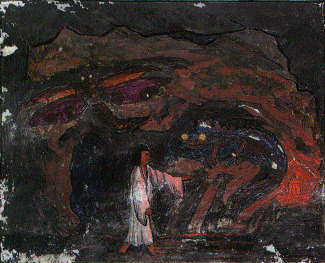
Jung describes a cave of black water, across which is a “luminous red stone.” I immediately thought of the lake in the cave in Harry Potter and the Half-Blood Prince, and the red stone is obviously a familiar image as well. Jung sees a severed head floating in the stream, a large black scarab, a red sun surrounded by snakes, represented in the next image:
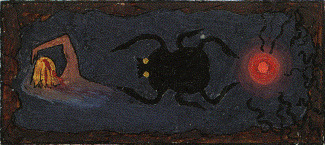
There’s some interpretation of these images, but before we get there, Jung writes at length about one of my favorite subjects — divine madness!
These lines really struck me:
When can I order my thinking to be quiet, so that my thoughts, those unruly hounds, will crawl to my feet? How can I ever hope to hear your voice louder, to see you clearer, when all my thoughts howl? […] The fullness of my knowledge threatens to fall in on me. My knowledge was a thousand voices, an army roaring like lions; the air trembles when they speak, and I am their defenseless sacrifice. […] Let me persist in divine astonishment, so that I am ready to behold your wonders.
As a person who deals with anxiety and shame on a regular basis, I can say from experience that the voices of one’s thoughts can be overwhelming to the point of being intolerable. I’ve had fight-or-flight triggered by my thoughts alone, even when nothing bad is going on in real life (e.g. over something as non-threatening as sending emails). Likening those thoughts to an army of dangerous animals is a great metaphor. It’s also “knowledge” that Jung feels threatened by in this scene — knowledge can be helpful or powerful, but it also interferes with the ability to interpret dream-images at face value. Later in this paragraph, Jung cries for mercy from “science that clever knower” and the “serpent of judgement.” This goes back to what I was saying before about the balance between the analytic and the mystical mind. This is one context in which empirical thinking and analysis need not apply. Jung’s instincts to explain and categorize everything, to force them to make sense, and to pass judgement make the experience of katabasis even harder than it already is.
That’s where madness comes in. Madness suspends logic, judgement, and categorization. Madness forces you to allow things to not make sense. It is the state of being submerged in raw, unfiltered unconscious. Here’s what Jung has to say about it:
This is how I overcame madness. If you do not know what divine madness is, suspend judgement and wait for the fruits. But know that there is a divine madness which is nothing other than the overpowering of the spirit of this time through the spirit of the depths. Speak then of sick delusion when the spirit of the depths can no longer stay down and forces a man to speak in tongues instead of in human speech, and makes him believe that he himself is the spirit of the depths. But also speak of sick delusion when the spirit of this time does not leave a man and forces him to see only the surface, to deny the spirit of the depths and to take himself for the spirit of the times. The spirit of this time is ungodly, the spirit of the depths is ungodly, balance is godly.
[…]
Thus can you differentiate sick and divine delusion. Whoever does the one and does without the other you may call sick since he is out of balance.
That phrase “suspend judgement and wait for the fruits” means almost exactly the same thing as something Dionysus told me: “Take your sanity off like a mask, and take everything at face value as you would in a dream.” When you’re traversing the Otherworld, the way to maintain your sanity is to deliberately suspend your sanity. Attempting to overanalyze everything will drive you crazy, literally, because the Otherworld doesn’t conform to any kind of human logic. So, just accept it. If you remove your sanity, then it’ll still be there for you when you come back, instead of it getting damaged by all the nonsense that bombards you.
Jung defines madness as the Spirit of the Depths overtaking the Zeitgeist, i.e. the unconscious mind subsuming the conscious mind. He also distinguishes deliberate, mystical madness from psychiatric disorders — in the former case, one allows the Spirit of the Depths to take over, while in the latter case, the Spirit of the Depths forces itself on the person. I’ve made similar distinctions in some of my answers, like this one. Psychiatric disorders are debilitating, and prevent a person from living a normal life, while my mystical madness doesn’t last beyond my deliberate engagement with it and doesn’t interfere with my normal life. I think it’s interesting that Jung says that when a person is forcibly overtaken by the Spirit of the Depths, they think they are the Spirit of the Depths. That seems to describe all the people I’ve encountered on the internet who claim to be gods, unable to distinguish between their own fixed identities and the massive, inconsistent identities of the spirits. Sometimes it’s good to experience that (“ego death”), but you have to come back down again.
I also think it’s interesting that Jung defines possession by the Zeitgeist, denial of the unconscious mind and its contents, as a sort of mental illness. Such a person is probably the sort who allows atheism or reliance on scientific objectivity to essentially replace religion, blocking out any engagement with the irrational aspects of existence and denying that there is any healthy or productive way to engage with them. (One of the things I think Jung got right is that irrational, mystical, and weird things are an inherent and manifest part of life, and that science needs to find some way of addressing them.) The healthiest mental state is some balance between the two. There’s our running theme of reconciliation of duality.
Jung continues:
But who can withstand fear when the divine intoxication and madness comes to him? Love, soul, and God are beautiful and terrible. The ancients brought over some of the beauty of God into this world, and this world became so beautiful that it appeared to the spirit of the time to be fulfillment, and better than the bosom of the Godhead. The frightfulness and cruelty of the world lay under wraps and in the depths of our hearts. If the spirit of the depths seizes you, you will feel the cruelty and cry out in torment. The spirit of the depths is pregnant with iron, fire, and death. You are right to fear the spirit of the depths, as he is full of horror.
Divine madness is useful and productive, but it’s still madness, and therefore scary as all hell. Looking God full in the face is going to cause insanity, the question is whether it’s the permanent kind or not. God is full of beauty and wonder, but don’t assume (as the Zeitgeist does) that its unfathomable beauty is fulfillment in and of itself, because you still have to confront the abject horror of it to get the full picture. If you don’t, the Spirit of the Depths will make sure you do on its terms instead of yours, and it won’t be pretty.
Jung also says this a couple of paragraphs earlier:
To the extent that the Christianity of this time lacks madness, it lacks divine life. Take note of what the ancients taught us in images: madness is divine.
I’m definitely going to be quoting this line in future posts, because this right here is one of the big reasons I prefer Dionysus to Christ. Madness is divine, but Christianity doesn’t often leave a lot of room for madness, or magic. It categorizes everything into very rigid theology and word-for-word interpretations of the Bible, despite mysticism being at its core and a constant lurking presence throughout its history. (Someday, I promise I will write a long answer on that.) It (sometimes violently) rejects everything that doesn’t conform to its framework as heresy. If Christianity lacks its madness and mysticism, and becomes more about the frameworks of orthodoxy and politics, its spiritual core is gone. One of the running themes throughout Jung’s mystical experiences, going all the way back to his childhood, is that he has to grapple with the fact that Christianity doesn’t serve his spiritual needs. He recognizes that it is incomplete, and that it focuses on only one-half of the equation, but because of the time and place he lives in, he can’t just hop on over to Dionysus like I could. We’ll get back to this, too.
Moving on. Jung provides some interpretation of the three images he saw in the Underworld: the severed head floating in the river, the black scarab, and the red sun:
Blood shone at me from the red light of the crystal, and when I picked it up to discover its mystery, there lay the horror uncovered before me: in the depths of what is to come lay murder. The blond hero lay slain. The black beetle is the death that is necessary for renewal; and so, thereafter, a new sun glowed, the sun of the depths, full of riddles, a sun of the night. And as the rising sun of spring quickens the dead earth, so the sun of the depths quickened the dead, and thus began the terrible struggle between light and darkness. Out of that burst the powerful and ever unvanquished source of blood.
We’ll get back to the dead hero, because that gets its own chapter. The black scarab I immediately associated with the Egyptian god Khepri, who pushes the sun. Another connection I made that I’m surprised Jung didn’t explicitly spell out has to do with his drawing of the red sun — it looks exactly like an egg cell, and it’s surrounded by snakes that look like sperm, one of which is touching it. Jung interprets the snakes as the reanimated dead matter that blots out the sun, but the drawing looks like a moment of conception. A significant portion of Liber Primus focuses on the conception of the god of the new age, which is explicitly a god that reconciles dualities. Here is the conception of the God, inside the womb of the Earth. And, I’m realizing right now as I write this… Zeus conceived Zagreus with Persephone, the lady of the Underworld, in the form of a serpent… Adding on to that, Macrobius identifies Dionysus with the chthonic or dark aspect of the sun: “They observe the holy mystery in the rites by calling the sun Apollo when it is in the upper (that is, daytime) hemisphere; when it is in the lower (that is, night-time) hemisphere, it is considered Dionysus, who is Liber.” Gee, I wonder who the god of the new age is! (Obviously, I’m biased, so take what you will from this.)
It struck me that Jung’s description of the Underworld is very pagan. It doesn’t sound like a Christian depiction of Hell at all. There’s no fire, no demons, no sinners being tortured, none of Dante’s creative punishments or Lucifer and his angels plotting revenge. Instead we get rivers, the sun, a scarab beetle, and loads and loads of snakes. Jung seems to agree, because in a 1925 lecture (cited in the footnotes) he says:
The light in the cave from the crystal was, I thought, like the stone of wisdom [the philosopher’s stone]. The secret murder of the hero I could not understand at all. The beetle of course I knew to be an ancient sun symbol, and the setting sun, the luminous red disk, was archetypal. The serpents I thought might have been connected with Egyptian material. I could not then realize that it was all so archetypal.
I don’t know the details of all Jung’s theories on why he saw these specific images, but here’s my theory: The “pagan-ness” of this Underworld is a sign that it can be escaped. Hell is a place of punishment, of permanent separation from God if not literal torture. The pagan Underworld is a place of death, but death is part of a cycle, and a lot of hero stories involve some sort of katabasis or symbolic death and rebirth. This is the nigredo stage of alchemy, a critical first step of the initiation process. The Christian concept of Hell does not represent that very well. That’s just my opinion.
The next section is a commentary on how events have no inherent meaning, but that humans assign meaning to events:
The events that happen are always the same. But the creative depths of man are not always the same. Events signify nothing, they signify only in us. We create the meaning of events. The meaning is and always was artificial. We make it.
Because of this we seek in ourselves the meaning of events, so that the way of what is to come becomes apparent and our life can flow again.
That which you need comes from yourself, namely the meaning of the event. The meaning of events is not their particular meaning. This meaning exists in learned books. Events have no meaning.
The meaning of events comes from the possibility of life in this world that you create. It is the mastery of this world and the assertion of your soul in this world.
The meaning of events is the supreme meaning, that is not in events, and not in the soul, but in God standing between events and the soul, the mediator of life, the bridge and the going-across.
I like this idea of God standing “between events and the soul.” Events have no meaning, stuff just happens. Looking for meaning in the external world is pointless, so it has to be found in the internal world. In order to put to use all of the information you find in the internal world, you need to bring it outward and impress your soul upon the external world. God is the mediator that allows you to do that. God translates the language of the internal world into that of the external world, and vice-versa. That’s basically the alchemical process and/or Hero’s Journey right there — journey into the internal world, receive spiritual insight, bring it down. I’ve been struggling with that last part, but I know it’s doable.
And now, we finally get to Shadow work! I’m just going to transcribe this entire section:
Therefore I take part in that murder; the sun of the depths also shines in me after the murder has been accomplished; the thousand serpents that want to devour the sun are also in me. I myself am a murderer and murdered, sacrificer and sacrificed. The upwelling blood streams out of me.
You all have a share in the murder. In you the reborn one will come to be, and the sun of the depths will rise, and a thousand serpents will develop from your dead matter and fall on the sun to choke it. Your blood will stream forth. The peoples demonstrate this at the present time in unforgettable acts, that will be written with blood in unforgettable books for eternal memory.
But I ask you, when do men fall on their brothers with mighty weapons and bloody acts? They do such if they do not know that their brother is themselves. They themselves are sacrificers, but they mutually do the service of sacrifice. They must all sacrifice each other, since the time has not yet come when man puts the bloody knife into himself, in order to sacrifice the one he kills in his brother. But whom do people kill? They kill the noble, the brave, the heroes. They take aim at these and do not know that with these they mean themselves. They should sacrifice the hero in themselves, and because they do not know this, they kill their courageous brother.
The time is still not ripe. But through this blood sacrifice, it should ripen. So long as it is possible to murder the brother instead of oneself, the time is not ripe. Frightful things must happen until men grow ripe. But anything else will not ripen humanity. Hence all this that takes place in these days must also be, so that the renewal can come. Since the source of blood that follows the shrouding of the sun is also the source of the new life.
As the fate of the peoples is represented to you in events, so it will happen in your heart. If the hero in you is slain, then the sun of the depths rises in you, glowing from afar, and from a dreadful place. But all the same, everything that up till now seemed to be dead in you will come to life, and will change into poisonous serpents that will cover the sun, and you will fall into night and confusion. Your blood also will stream from many wounds in this frightful struggle. Your shock and doubt will be great, but from such torment the new life will be born. Birth is blood and torment. Your darkness, which you did not suspect since it was dead, will come to life and you will feel the crush of total evil and the conflicts of life that still now lie buried in the matter of your body. But the serpents are dreadful evil thoughts and feelings.
You thought you knew that abyss? Oh you clever people! It is another thing to experience it. Everything will happen to you. Think of all the frightful and devilish things that men have inflicted on their brothers. That should happen to you in your heart. Suffer it yourself through your own hand, and know that it is your own heinous and devilish hand that inflicts the suffering on you, but not your brother, who wrestles with his own devils.
I would like you to see what the murdered hero means. Those nameless men who in our day have murdered a prince are blind prophets who demonstrate in events what then is valid only for the soul. Through the murder of princes we will learn that the prince in us, the hero, is threatened. Whether this should be seen as a good or a bad sign need not concern us. What is awful today is good in a hundred years, and in two hundred years is bad again. But we must recognize what is happening: there are nameless ones in you who threaten your prince, the hereditary ruler.
But our ruler is the spirit of this time, which rules and leads in us all. It is the general spirit in which we think and act today. He is of frightful power, since he has brought immeasurable good to this world and fascinated men with unbelievable pleasure. He is bejeweled with the most beautiful heroic virtue, and wants to drive men up to the brightest solar heights, in everlasting ascent.
The hero wants to open up everything he can. But the nameless spirit of the depths evokes everything that man cannot. Incapacity prevents further ascent. Greater height requires greater virtue. We do not possess it. We must first create it by learning to live with our incapacity. We must give it life. For how else shall it develop into ability?
We cannot slay our incapacity and rise above it. But that is precisely what we wanted. Incapacity will overcome us and demand its share of life. Our ability will desert us, and we will believe, in the sense of the spirit of this time, that it is a loss. Yet it is no loss but a gain, not for outer trappings, however, but for inner capability.
The one who learns to live with his incapacity has learned a great deal. This will lead us to the valuation of the smallest things, and to wise limitation, which the greater height demands. If all heroism is erased, we fall back into the misery of humanity and into even worse. Our foundations will fall into the cesspool of our underworld, among the rubble of all the centuries in us.
The heroic in you is the fact that you are ruled by the thought that this or that is good, that this or that performance is indispensable, this or that cause is objectionable, this or that goal must be attained in headlong striving work, this or that pleasure should be ruthlessly repressed at all costs. Consequently you sin against incapacity. But incapacity exists. No one should deny it, find fault with it, or shout it down.
Jung is speaking in the context of the impending World Wars. That’s the blood sacrifice that he refers to, but everything he says here is also applicable to Shadow work more generally. The reason why people kill each other is because they project their own Shadows, their own Depths, onto each other. The heroes are the ones that die, because people become heroes by going to war and killing a bunch of people or by dying nobly in battle. In order to do Shadow work, you have to admit that you are complicit in this violence, and that you are both the killer and the victim. You’re the one holding the gun. When Jung says that he is both “murderer and murdered, sacrificer and sacrificed,” I’m reminded of Dionysus executing Pentheus by dismemberment, the same way he himself was murdered. I’m also reminded of how bulls and goats were named as representations of Dionysus himself before being sacrificed to him, sacrificing himself to himself. As far as I know, Dionysus is the only Ancient Greek god with that particular dynamic, that direct identification with the animals (and fictional people) sacrificed to him. All of the sacrifice and blood and death paves the way for resurrection and restoration, as it does in alchemy.
These lines are particularly striking: “You thought you knew that abyss? Oh you clever people! It is another thing to experience it. Everything will happen to you. […] Suffer it yourself through your own hand, and know that it is your own heinous and devilish hand that inflicts the suffering on you…” You thought you knew the dark? Oh, you don’t even know the dark, buddy. Not until you see the abyss staring back into you. The real truth is that you are heinous, you are devilish, you are the thing you fear the most and the thing you think you’re fighting against. “Oh you clever people!” is my new favorite insult. Cleverness won’t help you against your Shadow. Shadow is stark.
Facing the Shadow also requires the death of the hero, your “perfect” idealized image of yourself. The Zeitgeist wants you to rise to this ideal and become the most moral, the most pure, the most powerful, etc. But this is just unrealistic. You’re human, and you’re flawed. The way to transcend those flaws is to learn to live with them, maybe even turn them into advantages. But to do that, you have to admit that the flaws are there. No matter how much you may try to sort your actions and qualities into good and bad, useful and useless, meaningful and meaningless, or any other dichotomy, incapacity still exists. Whatever you’ve rejected will always exist, weighing you down, until you figure out how to turn your weaknesses into your greatest strengths. I love the idea of “sinning against incapacity” because it is so transgressive but also so true. You can sin against the dark, too, because the dark is also God.
More to come!
#the red book#the red book jung#carl jung#jungian psychology#jungian archetypes#symbolism#mysticism#mystical experiences#mystical art#shadow work#dionysus#occult#occultism#liber novus#analysis#long post#illuminated manuscript
8 notes
·
View notes
Text
@imminent-danger-came
#On the other: I think Wukong very much did abandon macaque first lol#But they abandoned each other (It's why MK and Mei not doing so is 👌👌👌👌👌)#And I think like. Why should Macaque have to bail Wukong out and put himself in danger with all of heaven because of what Wukong chose to d#This post almost has the opposite problem of ''Wukong is villainzied while Macaque is a baby boy'' like#Wukong wasn't a good person either (they both suck(ed))#But he changed#''We can't change who we were yesterday or in a past life or a hundred lifetimes ago! We live with the choices we've made for what-#-matters is the choices we make right now!''#Like yeah obviously Macaque was biased. (He says so himself: ''Everyone is the hero of their own story'')#But Macaque also steps in in s2 because Wukong LITERALLY abandoned MK chasing after another source of power.#SWK is making the same mistake he always has. And then MK in s2 is ALSO making that same mistake#And Macaque had to be a loser about it but it is very interesting to see it from his pov.#He steps in when MK is acting that little bit too much like Wukong in all the wrong ways. (2x07 4x09)#But maybe I think in general that ''antagonist'' is a better word to describe macaque rather than villain
ok, putting all this under the cut because I disagree with this assessment!
I think Wukong very much did abandon macaque first lol: Huh, i... do not agree. Yes, wukong stormed heaven for more power, but he was literally side by side with macaque. that's not... abandonment. that's literally not the definition of the word. the two relevant definitions of abandonment are a) cease to support or look after (someone); desert, and b) condemn someone or something to (a specified fate) by ceasing to take an interest in them. wukong only did the second half of definition b? mac wasn't condemned without him, and wukong fought with him until it was time to go toe to toe with the jade emperor. yes, wukong did let his priorities overcome his affections, but wukong didn't leave him. before the battle he even made a specific point to include & support macaque when the rest of the brotherhood didn't notice mac wasn't there, like, wukong did not abandon him. it wasn't healthy and wukong WAS getting worse but wukong did not abandon him. In a non-judgemental way, I genuinely don't understand where you're getting that from...?
I do agree that mac was not obligated to bail him out and didn't need to, no other comments there. it was literally impossible anyway, wukong was just taking it out on mac. 2/10 man could have handled that better
(I even think him saying "great! just what I wanted! A peach!" and then following with "aw, I really wanted that peach" as soon as mac leaves could not more clearly indicate that he didn't mean what he was saying, and was just angry. mac clearly did though... ouch. peach representing friendship… rejecting it in the heat of the moment… wanting it back as soon as it's ruined… you get the idea.)
#But Macaque also steps in in s2 because Wukong LITERALLY abandoned MK chasing after another source of power. Also... not exactly? under the previous definition a, yes, but abandon is a really harsh word. If he had actually abandoned mk, he wouldn't have tried to do the training astral projections for him! Of course, MK FEELS abandoned because wukong didn't tell him he was looking for a way to protect him. wukong doesn't communicate because he wants to protect people from the truth, and ends up hurting them worse than if he just told the truth. major character flaw spotted lol. Still, this is a lack of communication thing, not intent to abandon (and by the dictionary definition, you cannot abandon without intent). I think the word you're looking for is neglect: give less than the appropriate level of care to, rather than leave entirely.
Wukong is a deeply loyal character. He doesn't give up on anyone, (Even a smidge makes all the difference, anyone?) unless they break things off first (see the brotherhood). Or he has a really bad day. (F for macaque) Wukong thinks the world of his loved ones and would never abandon them, no matter how far (literally) he goes for them. But he has been neglectful of them and not given them the appropriate amount of attention or communication, especially in comparison to his own goals. It's a difference of synonyms, sure, but it truly means the world to me!
I guess at the end of it, you see mac and wukong as equal forces in causing the other pain, and I don't think that at all: wukong has genuinely good intentions that are NOT centered around himself, that are emphasized in the show. macaque absolutely does not lol. it may have been different in the past, but mac never showed interest in protecting anyone except wukong, to the point of not being interested in the rest of the brotherhood or the monkeys.
This gets more into a personal theory, but mac's whole trauma brain seems way more severe than just one friend breakup/murder, to the point where he appears to mostly look out for himself even in flashbacks. it could be just his personality, but part of me genuinely wonders if he was learning those lessons well before wukong. For a character that shows up in one chapter in jttw and has no backstory before wukong in lmk, i seriously implore you to consider this one... much to chew on!
((please note a lot of this topic intersects with my own pain and is highly personal. i will drop this conversation like a hot potato if it ends up upsetting me, just as a warning!))
21 notes
·
View notes
Text
The Black Phone and Male vs. Female Representation
While watching The Black Phone a couple of weeks ago and after having seen several good reviews about it, between other opinions I had of the film more in relation with a review (you can check here if interested) of the story and characters, the contrast of female vs. male protagonists in horror movies stayed at the forefront of my mind.
Though not strictly a Slasher, The Black Phone brought to my mind an article I had read by Jeremy Maron where the author questioned the necessity of the existence of the specifically female term of Final Girl in recent years, arguing that it renders insufficient for the diversity of characters that can be a protagonist in Slasher films, for which he proposes the more inclusive term of Final Subject. Nevertheless, as I explore Finney Shaw’s (Mason Thames) hero’s journey and the difference in which female protagonist are represented in horror films, in this essay I propose the importance of maintaining the female specific term of Final Girl.
Spoilers ahead.
Explaining he doesn’t want to undermine Clover’s text on Slasher movies and her construction of the archetype of a Final Girl, Maron sees this usually female figure more as a concept than a specific character, rendering its sex unimportant because, as films like Nightmare on Elm Street 2: Freddy’s Revenge (Jack Sholder, 1985) have shown us, a male subject can fulfill the role of a Final Girl.
Before continuing, let’s remember that when Carol Clover proposed the figure of Final Girl in 1987, the Slasher catalogue was nowhere near as varied as it became years later; so of course her primary sources were limited which resulted in guidelines to what made both a Slasher film and a Final Girl quite simple but strict at the same time; therefore, though I do agree that what we should question the characteristics that make not only this archetype but the whole Slasher genre as a whole—specially with the diversity that in recent years has been able to slowly reach mass media—, I disagree with Maron who proposes the idea of the neutral gender Final Subject.
Firstly, because sex and gender are not the same thing, it’s imperative I briefly explain each concept. While sex is determined at birth and encompasses the physical attributes of either a woman or a man, ie. female or male reproductive systems; gender is constructed throughout an individual’s life and is affected by the context in which each person exists, for it depends of every aspect used by them to construct they way they present themselves to other.
Unlike sex—which depends on a clear difference between a penis and a vulva and deals with more tangible aspects—, gender is conditioned by the meanings society assigns to things outside of the body that at the same time influence it by adding certain values to it. Take fashion for example, on todays occidental society, heels are still linked with women, even though they have been historically used by men before; therefore, heels are thought in relation with femininity and womanhood, or queerness when a male body uses them.
Though clothing seems to be the most obvious example of what helps construct gender, there are other elements that have been assigned meaning as traditionally male or female, for example, crying or screaming in fear being related with women, values that are clearly represented in the horror genre as the concept of the Scream Queens shows.
As Clover herself explains in “Carrie and the boys”—her introduction to Men, Women and Chainsaws—, “Sex, in this universe [horror movies], proceeds from gender, not the other way around. A figure does not cry and cower because she is a woman; she is a woman because she cries and cowers.” (Clover, 2015, p.13) In other words, what makes a character a figurative woman or man is the femininity or masculinity that characterizes each of them, meaning, even if a figure has a male body, if they express more elements akin to what is considered traditionally feminine, they will be read as a female character. [1]
Nevertheless, being perceived as a woman isn’t the only way—nor the main one—to justify the validity of the specifically female term of Final Girl.
Based on a short story penned by Joe Hill—son of Stephen King—The Black Phone (Scott Derrickson, 2022) tells the story of a Denver suburb being terrorized by a child abductor nicknamed The Grabber. After several other disappearances, The Grabber finally kidnaps our protagonist Finney Shaw, who day by day receives phone calls on a mysterious disconnected phone that hangs on one of the walls of the basement he’s being kept in; all the while, Finney’s sister Gwen (Madeleine McGraw) tries helping the authorities find her brother with information she somehow receives via her dreams.
In this calls, Finney is able to talk with the spirits of the previous victims (killed by the antagonist) who give him tips, and tell him what to do and what not to in order to survive as well as different options to possibly escape his imprisonment. To Finney’s misfortune, said tips end up being mostly unsuccessful until the last previous victim (a friend of him) who lift his spirits up and manages to teach him how to throw a punch from the grave, which makes him able to defend himself and kill The Grabber, allowing him to exit the basement.
As Clover explains, one characteristic of the Final Girl is being resourceful and inventive to figure a way to defend herself on her own, and though it’s not unusual for protagonists to receive help, said help mostly ends up being inconsequential as they still have to rely on their own to survive. For example, Ginny Field (Amy Steel) from Friday the 13th II (Steve Miner, 1981).
In comparison, Finney’s courses of action are planned by the other victims while he simply follows their lead and when they fail, he seems to wait for the next call to tell him what to do. Then, as the climax of the movie ends, while the detectives and police are seen recovering the bodies of the deceased children from the basement of a house Gwen saw in her dreams, Finney comes out of the house on the other side of the small road, letting the authorities know The Grabber had two houses the whole time, one were he kept his victim still alive and the other where he burried the bodies.
When Finney sees his sister sitting in the grass in front of the house she discovered, she sees him as well, leading her to rise and run towards her brother to embrace him, and action repeated by his father moments later after he arrives to the crime scene, where he apologized over and over again to his children before there’s a cut to the final scene, where presumably days later, Finney returns to school with everyone staring at him in awe as he walks with new found confidence through the corridor towards his biology class where her lab partner and love interest greets him before ending the film with him asking her to now call him Finn, a representation of his new and more mature personality, presenting a character to development that seems to undermine the trauma a child would’ve gone through as they present him as a hero with a new found confidence.
In a similar fashion, while The Babysitter: Killer Queen (McG, 2020) is a horror comedy unlike The Black Phone, it also shows the male protagonist (Cole, played by Judah Lewis) at the end of the movie as a more mature version of himself as he begins to successfully grow from a boy into adulthood due to his experiences as a victim, ending up with the girl (Phoebe, played by Jenna Ortega) and even being happy as he retells the whole ordeal to the nurse/counselor.
In contrast, in movies like The Texas Chain Saw Massacre (Tobe Hooper, 1974), after finally managing to escape, the protagonist Sally Hardesty (Marilyn Burns) is clearly seen extremely distressed after enduring the abuse and violence at the hands of the Sawyer family, and even as she manages to get in the cargo bed of a passing pick up truck who drives her away to safety, as she laughs manically it becomes blatantly obvious she has lost her mind as a result of the whole ordeal, prohibiting or at least limiting—specially as we take into account the fact that this movie was made in the 70s—her “entrance into the symbolic” aka an adequate insertion into society.

Sally Hardesty escaping in the cargo bed of a pick up truck, The Texas Chain Saw Massacre, Tobe Hooper, 1974.
As Klaus Rieser explains, the female protagonist “… barely wins anything, most of the time only barely surviving her ordeals, sometimes even loosing her mind in the process. In difference to a typical male initiation story, she does not gain entrance into the symbolic, she does not get social approval in the form of ‘getting’ a boy.” (Rieser, 2001, p.13) As such, there’s a clear contrast in the way male and female characters are presented at he end of horror films as survivors; while a boy has grown and mature into what society thinks of a successful young man, the girl has lost her innocence and her mind, making us questions what part of her remains after her survival.
Finally, I’d like to add that as horror movies have a history of showing societal fears and problems—though I don’t reside in the USA—, ignoring what is going on at the moment with the overturning of Roe Vs. Wade would be ignorant of my part at best and would minimize the situation at worst; therefore, I’d like to express the importance of specifically female representation in media, specially when products like Slasher movies show the horrors of womanhood at the hands of a patriarchal society. As Catriona Miller says:
For young females, in particular, the outward reality they encounter is likely to be patriarchal in tone. As they move from childhood to adolescence, they must come to terms with changing bodies and emotions; but they must also come to terms with society’s changing responses to them. It may come in the form of a father’s altered attitude, unable to accept their little girl becoming a woman. It may come in the form of a freshly urgent note of jealousy and competition among friends and potential boyfriends. It may come in the form of male strangers in the street accosting them, or passing comment on their appearance, as even a brief glance at the entries on the Everyday Sexism Project website (Everyday Sexism Project, n.d.) makes clear. Despite several decades of feminist campaigning, it appears that sexuality still spells potential danger for young women.
Thus it may be looking at the phenomenon from the wrong perspective to insist that the films depict a repressive violence against women; rather, they may be a particularly stark representation of what it feels like to be female within a patriarchal society… (Miller, 2014, p.9)
In essence, though I fear I have drifted from what was supposed to be the main focus of this text, The Black Phone exemplifies the difference with which a male protagonist is treated in horror movies in contrast with how a woman or girl would’ve been treated if we take into consideration the history of Final Girls to date; for, though I don’t want to undermine the trauma Finney suffers at the hands of The Grabber, he is given a metaphorical manual on how to survive, while characters like Sally have been left to their own devices and lost their minds as payment for her survival. Therefore, I conclude not only the validity but also the importance of maintaining the use of the female specific Final Girl term to name the female protagonists that time and time again have to endure patriarchally justified violence.
——————
[1] I’d like to add that though I do think this categorization of what is feminine and what’s masculine perpetuates binary views that as time continues are becoming outdated, it’s not something I’ll tackle in this text as its main objective is demonstrating the validity and importance of the Final Girl figure rather than the proposal of new guidelines for her existence.
Sources:
-Clover, Carol J., Men, Women and Chain Saws. Gender in the Modern Horror Film, Princeton University Press, 2015, 260p.
-Maron, Jeremy. “When the Final Girl is Not a Final Girl: Reconsidering the Gender Binary in the Slasher Film.” Off Screen, vol. 19, no. 1, January 2015.
-Miller, Catriona, “You can't escape: inside and outside the ‘slasher’ movie”, International Journal of Jungian Studies, Vol. 6, No. 2, 2014, p.108-119.
-Klaus, Rieser, “Masculinity and Monstrosity Characterization and Identification in the Slasher Film”, Men and Masculinities, Vol. 3, No. 4, 2001, p.370-392.
-Image taken from here
#the black phone#movie review#FG reviews#Final Girl in College#essay#film studies#michael myers#horror#movies#horror fan#horror movies#horror movie analysis#female representation#feminism#gender studies
40 notes
·
View notes
Text
Lessons that Last Forever
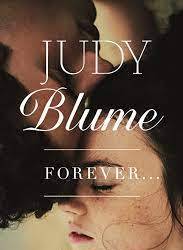
Forever by Judy Blume is a book that interested me when I first heard about it. What does it take for a book to be banned in schools? It must certainly have some juicy and interesting things to read about. After reading it at 21 it did not shock me anywhere near as much as I was expecting, I found myself wondering this is all it takes to get your book banned? The book has sexual themes certainly but nothing in graphic detail and honestly the message the book had was one I thought was very important to see for us young adults.
There are a lot of things I had wished I learned a bit sooner in my life and I found that books like Forever can show little lessons like this. The book follows Katherine in her journey of sexual exploration with her first partner Michael. Katherine learns a lot about herself and Michael as they closer and become more intimate. Most importantly Katherine takes her relationship with Michael very slowly and seriously, she closely adheres to what she is comfortable with and waits until she is ready to advance further physically with Michael. This is a great thing for a book about fiery young romantic love to show, because while it may seem very exciting to take a relationship very fast, its very important to do things slowly too. Katherine regularly turns down Michaels's advances even when they get very pressing. While this may seem most applicable to romantic relationships this advice really applies to life generally. When I was younger I felt a huge rush to grow up and experience as much as possible but it really is okay to take every step as slowly as possible so you can enjoy every experience you get to have.
Forever is very clearly interested in exploring the sexual dynamics of young adults and lots of sources that analyze this aspect as its primary focus, "'You can't go back to holding hands.' Reading Judy Blume's Forever in the #MeToo Era" by Jenna Spiering and Kate Kedley. While that is a large part of the subject material Forever explores I find it reductive to only hone in on that aspect. Spiering and Kedley refer to how "Young adult romance novels, a common venue for sexual content, are not always a humanizing genre." (15) I fully agree here, however they go into more detail explaining the harms of loose technical language and the intricacies of specific sex acts, highlighting Forever's emphasis on character agency. So while this an important aspect of representing these characters I want to elaborate on the importance of "humanizing" these characters outside of their sexual importance. Its common to read Forever as a book about sex but its a book about young adults in a relationship and in my opinion that allows us to get a lot more out of it.
Spoilers ahead: Despite the book's title of Forever things do not last between Michael and Katherine forever, and by the end of the book they are no longer together due to Katherine meeting someone new. By the end of the book Katherine meets someone new after time away from Michael and they are no longer together. This is a tough thing to experience as a young person but I wished I had fully come to terms with the idea that many people will come in and out of your life when you’re growing up and even later it keeps happening. However, it's easy to take away from this book that this relationship wasn’t as big a deal as it seemed and my parents have done the same thing, dismissing early relationships as if they wouldn’t go anywhere. But Katherine and Michael loved and learned a lot from each other, and this is a wonderful thing, don’t let the fleeting nature of these relationships stop you from enjoying them. All experiences like this matter and will help shape the type of person you become as you grow up so don’t forget to enjoy them and try to learn as much as you can from them.
2 notes
·
View notes
Note
I think we largely agree but I don't consider letting go of control and emotional connection mutually exclusive. Having a strong connection is what allows you to trust someone enough to let go. Trust is a wide umbrella of which vulnerability is one part. We know Paul only allowed himself to be truly vulnerable with Jane at that time. Alistair Taylor said this was why he struggled after she left. When George was dying, Paul made out it was big that they held hands but we know from George's other friendships this wasn't the case on his end. There was always an unspoken distance between them which made it harder for George to understand Paul.
A major goal of taking LSD together was for them to break down their barriers and become bonded like never before, to reveal their subconscious to each other. What was revealed to George was that Paul's distrust went deeper than he realized. I don't think it was personal against George but I get why it hurt him a lot.
I say it represented their whole relationship because there was a theme of Paul not letting George in or trusting him for long. Sometimes it was the guitar in a song or taking acid. According to Leslie Cavendish, Paul only consulted John when filming MMT. In Rishikesh he was antsy about getting back to work and mainly worked with John to set up Apple. Later it was George's songwriting + filling the John void, and in general it was taking him seriously enough to see him as more than a little brother. And the vulnerability I mentioned before.
I don’t think letting go of control and emotional connection are mutually exclusive, but I also do not think they are the same thing. I’m not arguing that Paul actually was emotionally available. Paul has made it clear that vulnerability was difficult for him (e.g. holding hands with George was unusual for him, but normal for George). My point is that I don’t think this means that Paul actually wasn’t close to the other three and that I don’t think it was a key source of tension in the breakup. I get why Paul not taking George’s hand on LSD would have been hurtful, but I don’t think it symbolizes their relationship. The problem between George and Paul was not “George keeps reaching out and Paul refuses to open up.” The problem was the Paul was being insensitive to George’s feelings.
All the examples you mention -- Paul dictating George’s guitar part, Paul only consulting John on MMT, Paul only working with John to set up Apple (is this even true?), Paul’s indifference to George’s songwriting -- none of this reads to me as Paul not “letting George in.” It’s not a lack of closeness; it’s a lack of respect. And I don’t think those two things are the same. I love my brother and we are very close, but I know he thinks that I sometimes cannot admit when I am wrong and he gets really pissed off at me about this. Our emotional closeness helps with resolving the issue (and I assume if Paul and George were able to communicate their emotions more effectively, it could have helped them resolve their problems), but the crux of the issue isn’t that we aren’t close. It’s that I am being stubborn and bossy. Additionally, I don’t think these problems stem from Paul not trusting George, unless we’re defining “trust” as “trusting him to be right,” which is a definition of “trust” that does not include emotional intimacy.
My point is that the problem wasn’t Paul not opening up emotionally to George. It was that Paul was, as you said, treating George as his little brother and not taking him seriously. And I do not think that is that relevant to emotional intimacy. I also just really don’t buy the idea that Paul actually wasn’t close to the other three, that the three of them were close and Paul was closed off from this. I don’t see the evidence for this.
TLDR: Paul’s lack of emotional vulnerability wasn’t the key to the disintegration of his and George’s relationship.
2 notes
·
View notes
Text
D&AD - Week 1
Briefing Session
Unfortunately, I could not attend the D&AD briefing. Without any real idea of what the brief is about, I decided to choose Netflix out of all groups, as it is a platform I spend a lot of time on, and watching films is how I spend my spare time usually.
At the briefing session for FMP, we were also shown some previous work from students. All of them looked exceptionally well designed and professional, which made me wonder how could you achieve something like this only within 5 weeks. The limited time we had to deliver this project worried me but, at the same time, gave me the determination to work harder on it.
When I read the brief, I thought Clem and I were people whose first language is not English. We could work on this project, making it a personal experience for us.
First Meeting with Clem
For this project, I teamed up with Clem, with whom we are close friends. Our first meeting concerning d&ad was full of brainstorming ideas.
We immediately talked about how emotions can communicate without language barriers. Shows how the emotions we experience have no language; They are universal. Regarding getting people to engage with each other, language does not matter.
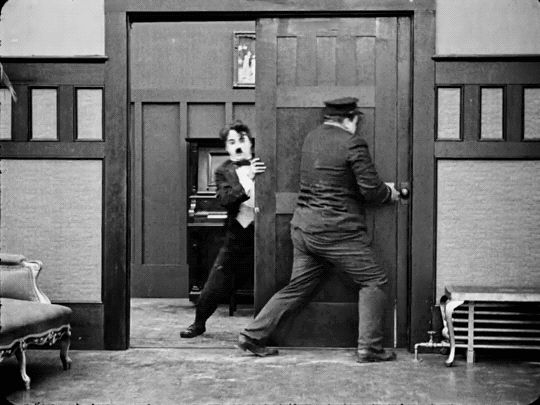
A way that happens is through music. During our conversation, we talked about how we do not necessarily need to know the language of the song to get emotions from it. We can feel a stronger connection to a foreign song than one of our mother languages. A good example of this is Eurovision. Artists representing countries from all over Europe perform mostly foreign songs, and the audience goes crazy about them almost every year, with most of the people not knowing what the song is about, Just letting their emotions take over through music. What if the same happens when foreign languages are used in films?
At that point in the meeting, we started discussing what our outcome could look like. We both agreed that we would like to produce something relevant to our design practice that can be used for our portfolio, as we will start looking for jobs after graduating. That said, we tried to narrow down our options and decided to work with typography in motion design and animation.
How do you feel? How do you visualize it? Bold? Serif? Italics? Which colour describes your emotions the best?
To establish a better idea of how we would like the aesthetic of our work to look, we did some research to gather sources and ideas.


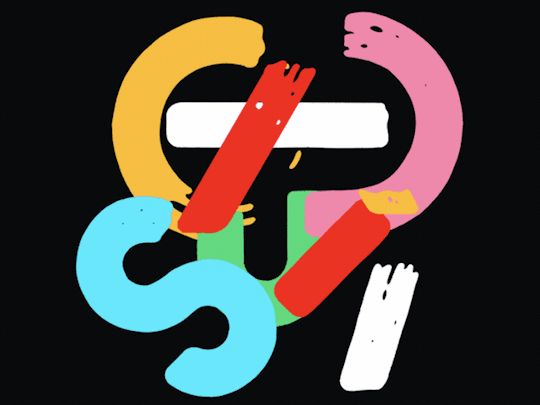
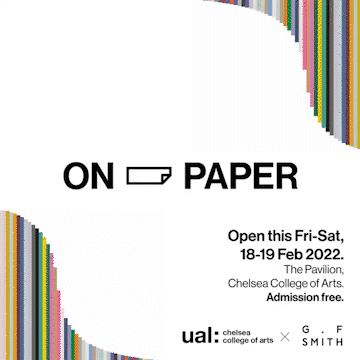
0 notes
Note
why do you ship chell and glados if glados is basically her mom
Okay this is actually a pretty common misconception in the fandom that unfortunately a lot of people have taken as canon, but I’m feeling nice so I’ll answer your question.
Basically, anon is referencing a theory from around 2012 that Caroline is Chell’s mom. The evidence for the theory is as follows:
- The turret opera calls Chell “bambina”, which means “little girl” in Italian
- Chell’s name can be found on a Bring Your Daughter To Work Day science project
- GLaDOS references the possibility of Chell being adopted multiple times
- GLaDOS is significantly nicer to Chell after discovering she’s Caroline
And, anon, you’re right, it does sound like a pretty good argument at first glance. The problem is that a lot of these points don’t actually hold up to scrutiny.
For example, although “bambina” literally translates to “little girl,” it’s often used in the same way “baby girl” is used in English - it can mean child, but contextually it’s usually a flirtatious term. (Source: Cambridge Dictionary)

For Chell’s science project, it doesn’t work as evidence for the theory because GLaDOS killed the scientists around 1998-ish, when Caroline had presumably been uploaded several years earlier and Cave was already dead. Also, Chell’s in her 20′s, and since we know from Lab Rat/Portal 2 that people don’t age in stasis, and that Doug put Chell at the top of the test subject list only weeks after the takeover, Chell was 28 at the time of the takeover. The science project is really only an Easter egg and doesn’t actually fit into the canon timeline let alone prove anything about Caroline and Cave.
GLaDOS talking about Chell being adopted is a pretty strong point, I’ll admit, but also it’s important to remember that maybe half of what GLaDOS says is true. And even if we take what she says at face value, she also says there’s a man and a woman in stasis with Chell’s last name, which could not have been Cave and Caroline because they were already dead at that point. And the official book Final Hours Of Portal 2 confirms Cave and Caroline were not married and could not have shared the same name anyway. It was also the 50′s, an an unmarried couple of two likely famous people having a child would’ve been scandalous, and yet we see no hint of something like this affecting their company.
Also, although GLaDOS is nicer to Chell after the Caroline reveal, that’s not necessarily indicative of a mother-daughter relationship, and neither is any of their interactions. It’s just. GLaDOS being friendlier.
Finally, when this theory was made (and let’s be honest - it still is happening) Chell was constantly whitewashed to hell and back.
Chell is Japanese-Brazilian, and Cave and Caroline are white, so it would be a near impossibility for her to be their biological child (and insisting otherwise is kinda. just. whitewashing). And although people will cry “adoption!”, based on what I’ve previously proven, that’s pretty much impossible. This theory that somehow she’s Cave and Caroline’s daughter erases an important part of her identity. [Disclaimer, I am white, but this is what I’ve heard from around the fandom]
With all that said, the idea that she’s the daughter of Cave and Caroline really doesn’t hold weight when you really analyze the canon. It’s surface level analysis that doesn’t hold up. And honestly? The idea kinda cheapens the story. It’s much more powerful that GLaDOS learns to care about Chell and becomes kinder than just. Oh, she remembered she’s related to Chell.
But to actually answer your ask.
Why do I ship them?
Well, they aren’t mother and daughter, I think that’s pretty obvious now. But if you actually look at a lot of subtext in Portal 2, without the lens of the mother theory, it’s actually pretty romantic!
I know that sounds ridiculous, but bear with me!
Now - it’s totally okay if you don’t ship them. I get it. Their interactions in Portal 1 and the first half of Portal 2 are toxic if not outright well. Y’know. Murderous. I completely understand why that turns people off from shipping them, and ultimately, shipping is a personal thing. To each his own.
But before you judge me, let me present my case.
Exhibit A: Portal
Portal is kinda gay. No, really. Chell and GLaDOS are enemies in this game, but the entire focus is on their relationship (good or not) and the power struggle between them. They are opposites, two sides of the same coin, different representations of opposite ideologies. People have analyzed Portal as a relationship metaphor, or as a metaphor about women’s role in society - either way, the heart of Portal is the complicated dynamic between Chell and GLaDOS.
That’s not necessarily enough to code a romance, but a lot of popular (and especially popular queer ones) ships begin with opposite ideologies, symbolic powers colliding. Portal cements their relationship as a toxic one, something on the verge of falling apart and hurting both parties in the end. The ending image, of Chell and GLaDOS side by side after the battle, reinforces the symbolic parallels between the two.

The companion cube is also pretty symbolically important to this interpretation. It’s literally a representation of someone’s heart, and you are told to protect it and preserve it under GLaDOS’ orders, and then you have to destroy it regardless of how you actually feel about doing that. You are destroying GLaDOS’ heart, so to speak.
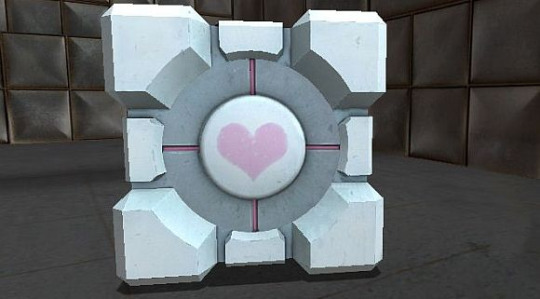
There’s also the ending song, Still Alive. The lyrics speak for themselves.

They hint that GLaDOS’ feelings about Chell are more complicated than they may appear (if she’s not being sarcastic...) and she literally talks about Chell breaking her heart (also, think back to the companion cube. Yeah.). The entire song is structurally similar to many a breakup number, with the laments of “I’m glad it happened, but also leave.”
At the end, we also see that the long promised cake GLaDOS was supposedly lying about was real the whole time. Before Portal 2 came out, it was mostly interpreted as a stinger ending (along with the nicer lyrics of Still Alive) to make you question GLaDOS’ true motives and intentions.

She actually did have a real cake waiting for you. (Side note - not really evidence, but in Argentina, “torta” means cake in Spanish. It’s also a slang term for lesbians. So. Do with that what you will). The cake is what GLaDOS offers you to lull you into the sense that she cares about you, so discovering that “the cake is a lie” wakes you up to the realization that she doesn’t. Except then the idea is subverted one last time, at the very end, showing that the cake is real and at least some of what she said she meant.
You also see the companion cube. You know, GLaDOS’ symbolic heart?
Now, okay, you might be thinking I’m extrapolating a bit too much. And you might be right. But Portal is not the only game in the series, and if you’re asking me about Cave and Caroline you obviously know about Portal 2.
Exhibit B: Portal 2
If you thought Portal was gay, Portal 2 turns that up to 11.
Even before GLaDOS wakes up, you’re treated to some visual subtext. A few of Rattmann’s drawings representing the events of Portal 2 focus a lot on the relationship between GLaDOS and Chell, with more of the cake symbolism.

In this, you can see a face layered on top of GLaDOS. This could be foreshadowing about Caroline, and likely is, but also resembles his other drawing of Chell. It insists that Chell is a part of GLaDOS, or reinforces parallels between Chell and Caroline, hinting at something either way.

In this picture, we also see Chell standing on top of GLaDOS, in the same position where the overlay of the feminine face was, again referencing the parallel. It also presents them as opposites, fundamental parts of the same thing and both connected to the same basis, but on opposing sides.
When GLaDOS wakes up, she returns to her antagonistic role, but there are more hints to something deeper just like in Portal.

Here, in her awakening lines, she references Chell not unlike an estranged ex. Also worth noting that GLaDOS is pretty much the personification of testing (in a sense, she is testing since she can control all of Aperture like an extension of her body), and insinuates that Chell loves to test. And that she reciprocates that feeling.
In test chamber 10, she says this:

It’s supposed to be threatening, but it does read as almost... sentimental.
There’s also another chamber with companion cubes in Portal 2. I already talked about their symbolism in Portal, and the same pretty much applies to them here. However, GLaDOS says something interesting about them during this level:

Once again, meant to be intimidating, ends up coming off as “well, GLaDOS, why were you going to give Chell a heart shaped representation of yourself that says ‘I love you?’” And you might think I’m stretching the GLaDOS’ heart metaphor thing a little far here, and I might agree, if the companion cubes didn’t literally sing Cara Mia for you.
Cara Mia is the turret opera from the end of the game, which is all about how much GLaDOS cares about Chell. More on that later. But the companion cubes play a song called Love as A Construct, and when you get close to them, they sing a specific part of the song that has the tune of Cara Mia. These things literally exist to sing about GLaDOS’ feelings.
Which makes this line a lot more. For lack of a better term. Tsundere-ish.

Then, right before the escape, she starts talking about the confetti from her fake surprise.

I really don’t have to explain this one. What else does GLaDOS consider an inconvenience but might miss anyway? Or, more aptly, who else?
Then, during the escape, she teases a (fake) final test chamber in front of you, and forms the panels in the shape of a heart. No, really.
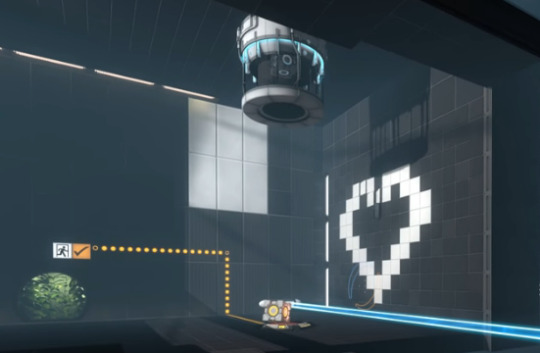
Up to this point, a lot of the points I’ve presented are interspersed with a fair amount of antagonization on GLaDOS’ behalf, more Foe Yay than anything actually hinting at something deeper than GLaDOS being conflicted about whether she loves or hates Chell. But things really ramp up after Wheatley’s betrayal, when the two of them are forced to team up. (I should also note here that “enemies to lovers” is a pretty classic queer romance trope.)
Here, GLaDOS is put on an equal level with Chell and they have to rely on each other if they want to survive. For the rest of the singleplayer campaign, GLaDOS becomes a lot nicer and even friendly to Chell. There comes a point where she starts referring to Chell as a teammate, calling them “we.” She begins to consider them one unit, two opposites unified. Here’s what she says after the lemon rant:

You can not only see her using we, but actively talking about how her and Chell are going to fight Wheatley together. There’s also that last line - “let’s explode with some dignity.” GLaDOS has fully accepted the very likely possibility that she and Chell might die together. That she might die on the same level, and the same team as Chell. And she seems... surprisingly okay with that, as long as she and Chell go together.
It’s during the Old Aperture levels that Chell and GLaDOS also discover that they have a lot in common. This is the part of the game where GLaDOS figures out she’s Caroline, that she’s human. Or, that she’s like Chell. And Chell discovers (from what we can tell anyway) that Caroline is kind, that she’s funny and smart and so many of these things she never noticed about GLaDOS before. Now also with the knowledge she is fighting alongside another human being.
You can also draw parallels between Chell and Caroline, both intelligent women ultimately betrayed by their seemingly innocuous male friends before being trapped in Aperture and forced to team up with one another in a way that will free both of them. We see that really, GLaDOS isn’t that different from Chell - she too has been imprisoned in this place against her will, but in a completely different way. Once again, the idea of two sides of the same coin applies here.
I’ve written another meta about this before, but I also think the whole idea of repressing a part of your identity and hating it, before bonding with another woman and then realizing that it’s okay to be like her and to be on her side. It’s okay to be yourself and meeting her is what helps you discover this new part of yourself. Is kinda inherently gay. GLaDOS’ discovery of her own humanity just fits so well into a queer realization narrative, to me at least.
Then, Chell and GLaDOS escape Old Aperture and have to get through Wheatley’s tests.
Here, GLaDOS isn’t just begrudgingly on Chell’s team. She’s actively helpful. She wants to help Chell solve tests, defends her from Wheatley’s insults, and makes jokes to lighten the mood. Things that can really only be explained by her caring about Chell, especially the part about the insults. See below.
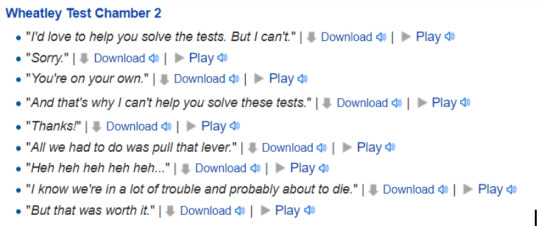

After the two escape Wheatley’s testing track, right before the boss fight GLaDOS has a few other things to say.

GLaDOS is not going to betray Chell, because of some kind of conscience. But she could easily ignore that back in her body, and yet? Here she’s deciding not to, and for no good reason. She didn’t have to say that to Chell, but she did, because she cares and she wants Chell to live.
And then, moments before the fight:

The final lines imply that GLaDOS does not think of Chell as an enemy anymore, and that it doesn’t matter what Chell thinks because they are in this together and they are getting revenge together. It’s pretty heartwarming to be honest, to know that even in a fight that will almost certainly kill you, she is there rooting for you and caring about you, even if you don’t feel the same way about her. It no longer matters to GLaDOS whether you even reciprocate - you staying alive, you making it through is enough for her.
So Chell fights Wheatley and sends him into space, all well and good, and at this point, GLaDOS has the option to kill Chell. But not only does she not, she actively saves Chell, and holds her hand in the process. If you don’t believe me:
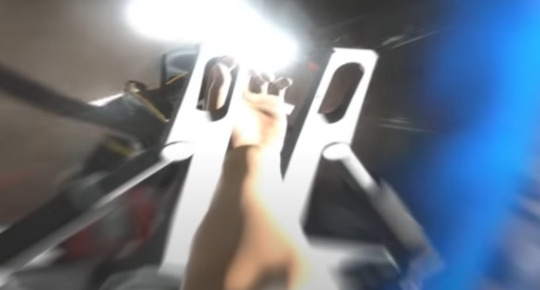
And not only that, but when Chell goes unconscious from her injuries, GLaDOS sits and waits for her to wake up. It’s also implied that GLaDOS carries her to the elevator, since it’s where she wakes up but not where she passed out. In the scene where Chell blacks out, you can also hear the part of Love As A Construct that sounds like Cara Mia. Yeah. Yeah.
If you think that this cannot possibly get any gayer, you are wrong again, because then GLaDOS makes her final speech. Which is really just a love confession, let’s be honest.

The “surge of emotion?” Do you mean love, GLaDOS? And the idea of GLaDOS considering Chell her best friend, despite everything these two have done to each other? The idea that GLaDOS, out of all people, forgives someone?
Except this isn’t even Chell’s final send-off. GLaDOS writes her an entire opera of turrets, that sing a literal love song. (Note what I said earlier about the use of the word “bambina”).

It really can’t get any more obvious than that. “My (affectionate romantic term here), my dear, I adore you.” How. Is. That. Heterosexual. In. Any. Way.
So Chell goes to the surface, set free by GLaDOS (think of the saying “if you love something, set it free), and you think that’s the end. Until GLaDOS gives you a companion cube so you aren’t alone on the journey, and from the burn marks, you know it’s your first companion cube. Her original heart, her first gift to you, a piece of her that she wants you to carry with you to remind you that she does care about you after everything. It also gives the lyrics to Still Alive a much more genuine meaning.
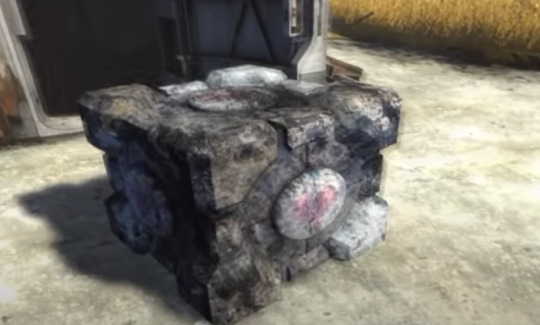
Portal 2 ends, and then the ending song, another GLaDOS number plays. Just like Still Alive, Want You Gone is structurally a break up song and very obviously about GLaDOS missing Chell and “counting on” (read: caring about/loving) Chell’s tendencies and quirks.

She’s accepted Chell completely, and yet also given Chell the one thing she wants most. Only wanting Chell gone can mean GLaDOS not wanting Chell in her life anymore, but can also mean she wants to give Chell the freedom she’s wanted for so, so long. It’s the best thing she can give.
In the co-op campaign, GLaDOS also references still caring about Chell.

And that’s the end of the Portal series. Except. Brace yourself. Despite the games being over, there is STILL more subtext somehow. It gets. Even gayer.
Exhibit C: Supplemental Evidence
Valve has made a lot of extra/cut content for the Portal series, and I’ll be looking at some of it below.

This official valentine from Valve shows GLaDOS offering a romantic partner cake, which as we’ve established before, is very symbolic of GLaDOS’ feelings about and/or relationship with Chell.
There’s a lot of other concept art and official art that emphasizes their relationship too. See below.

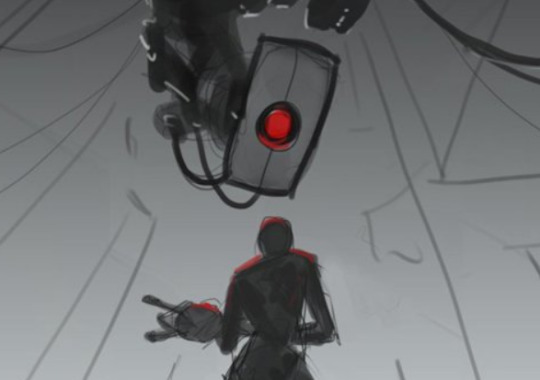
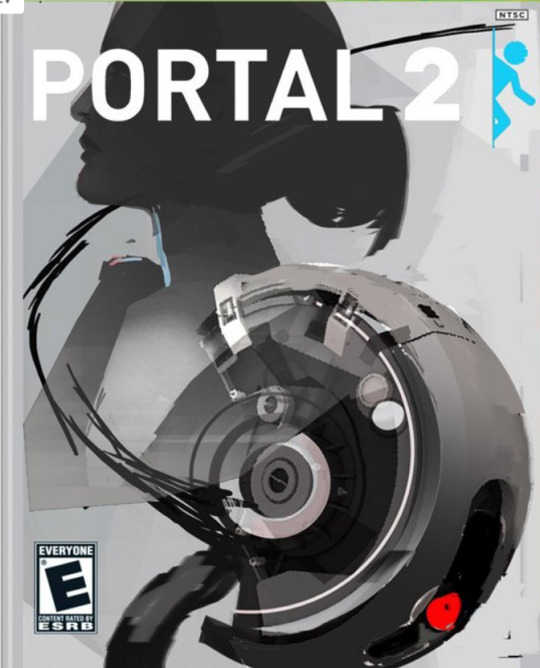
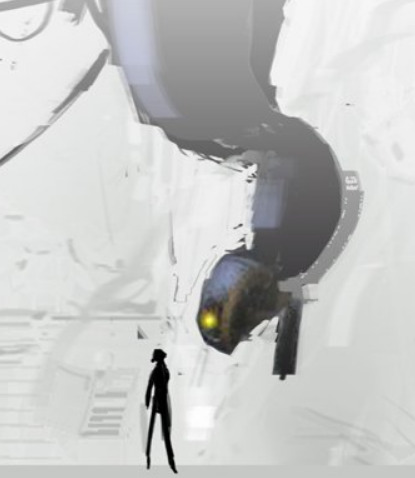
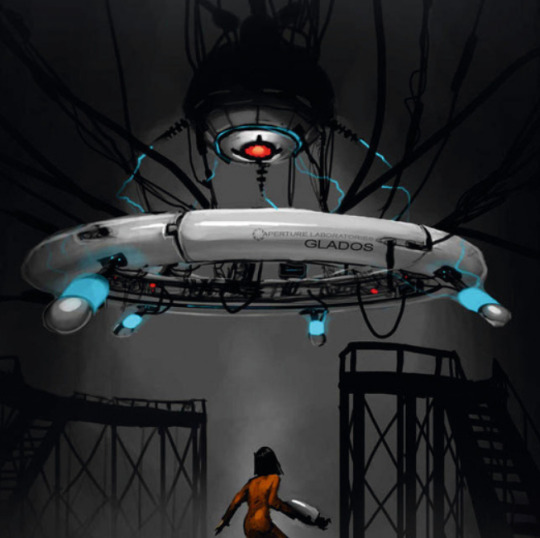


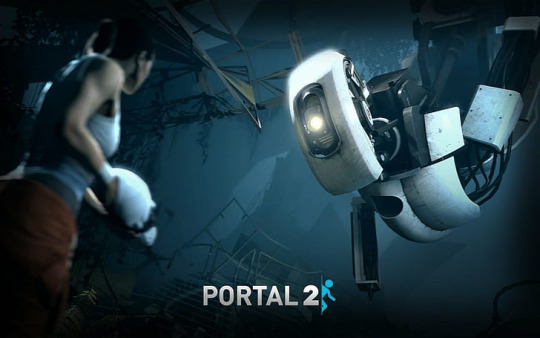
There’s also some cut GLaDOS lines that are even gayer than the source material and again, sound like confessions or references to a breakup:

The idea of “discovering things about someone”... how much more obvious can it get?
The developers have even confirmed a lot of my commentary on Chell and GLaDOS’ relationship in The Final Hours Of Portal 2. See these quotes from the book/this post:
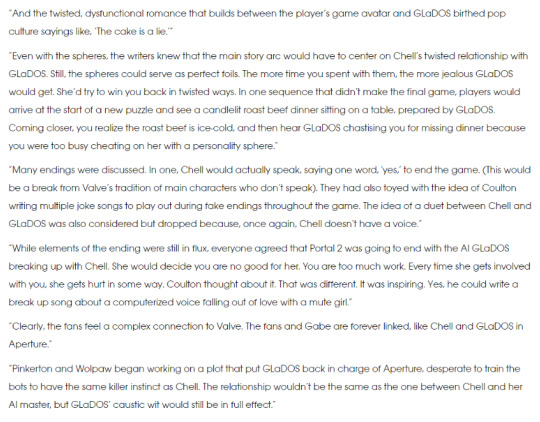
The devs literally describe it as a romance. They use terms like “cheating,” they wanted to write a romantic duet, JoCo purposefully wrote the endings like love songs. It is literally, blatantly said by the creators of the game that their relationship is interpreted romantically. By the creators of the game.
And if Word of God confirmation isn’t enough for you, have a song written for a cut alternate ending by GLaDOS’ voice actress, Ellen McClain. The song is literally nothing but GLaDOS talking about caring about Chell, about not wanting her to die/leave GLaDOS alone, about wanting to bake a cake with Chell, about waiting for Chell to wake her up. It’s so genuinely sweet and sad, and really, really romantic in the most heartwrenching way possible.
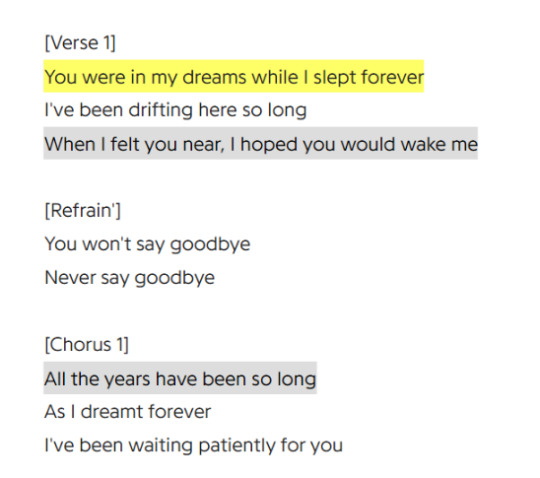
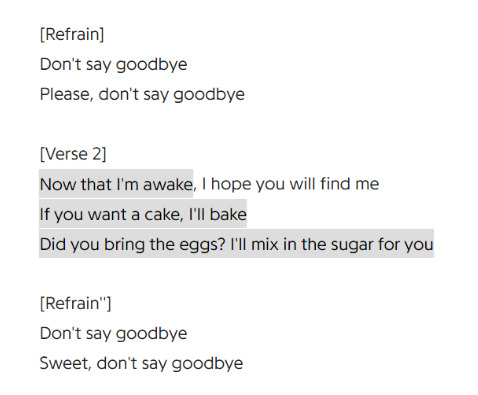

JoCo also came back for the Portal levels in Lego Dimensions, writing one final breakup song for GLaDOS to sing about Chell. It comes off as GLaDOS not wanting to admit she misses Chell even though she obviously does, trying to replace their relationship but failing, and even explicitly forgiving Chell/wanting her to come back.
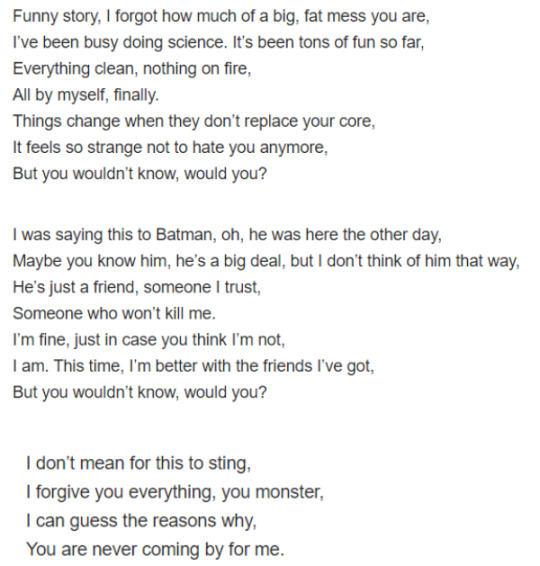

Also, the “finally I understand,” as if only now GLaDOS understands just how deep her feelings for Chell are... What else can I say?
In Lego Dimensions, GLaDOS also outright rejects anyone who isn’t Chell.

In Conclusion:
Why do I ship Chell and GLaDOS?
Well, ultimately, it doesn’t matter whether I ship them.
Because I think it’s glaringly obvious Portal does.
3K notes
·
View notes
Text

[Image Description: An Undertale chat box that has “WHY FANS LOVE UNDERTALE” at its center. Next to it are a line chart and an Egg from the Dating Hub on its left, and a CRIME measurer (also from the Dating Hub) on its right. End I.D.]
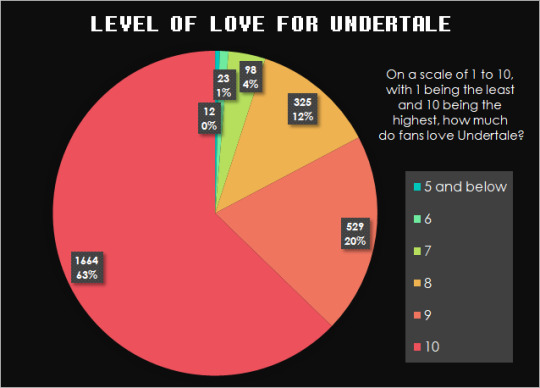
[Image Description: a pie chart titled, “LEVEL OF LOVE FOR UNDERTALE.” The textbox on the top right reads, “On a scale of 1 to 10, 1 being the least and 10 being the highest, how much do fans enjoy Undertale?” From the top going clockwise, 12 or 0% chose 5 and below; 23 or 1% chose 6; 98, or 4%, chose 7; 325, or 12%, chose 8; 529, or 20%, chose 9; and 1664, or 63%, chose 10. End I.D.]
It’s clear from all of the data analyzed so far that fans who took the time to answer our survey love Undertale. It is unlikely that they would have taken the time to answer so many questions if they had not, and even less likely that they would have come across our survey in the first place. Naturally, it comes as no surprise that 63% of our responders gave their love for Undertale a score of ten out of ten. 95% gave their love for Undertale a score of eight or higher, and only 12 responders responded with five or below, a number so small that their responses had to be lumped together to be visible on the pie chart. Of those, only 3 responders gave their love for Undertale a score of 1, and based on those responders’ other answers, it is likely that they were only intending to troll. We are very fortunate that the vast majority of responders took the survey seriously, enough so that responses like this are barely a blip in the data.
Now, for our final analysis post of the event, we will delve into the reasons that fans love Undertale so dearly.
(Essay and highlights under the cut.)
There have been countless essays on the impact that Undertale has had on people’s lives. I can hardly add more on the subject than what has already been said, but I hope this summary can provide a brief overview of what stood out among the over two thousand answers given in response to this survey. That said, due to the sheer volume of answers, I could not read every single one in depth—however, I did skim all of them, and some that stood out or were representative of several responses have been highlighted below. If you would like to see what every fan who consented to share their response had to say, you may view the full list of responses here. Note that these responses have not been edited in any way. This document may take a long time to load, as it is over 100 pages long.
(Warnings for mentions of suicidal thoughts in the following essay.)
Several responders loved the theme of choices mattering in Undertale. Whether people played the pacifist, merciless, or neutral routes, they enjoyed how the game reacted to their actions. For some, it even made them consider their own morality. One touching response explained the impact that the theme of mercy made on them. “I realized that Mercy isn't something that's given to those who deserve it. Flowey didn't deserve it. I don't deserve it myself. Shoot, we ALL need Mercy in our lives.” Many fans left similar comments about how the themes of Undertale made them better people.
Undertale changed how its fans treat others, and it also changed how fans treat themselves. The theme of staying determined and the messages of hope in the game were a light to a very large portion of fans. I cannot list all of the fans who said that Undertale helped them out of a dark place, or that they would not be alive if not for Undertale. “DETERMINATION became a metaphor for not killing myself at a really rough time in my life and I’ll always cherish that. Undertale isn’t afraid to go to really dark places but at the same time holds on so tight to its hope.”
Undertale brought fans together in unexpected ways. Some said they met friends or significant others through the fandom. “I wouldn't have met my now husband without Undertale,” one fan said. A different fan who is non-native English speaking mentioned that the game and the fan community helped them to learn English.
It would be impossible to discuss Undertale without mentioning the fan community. Whether for good or bad, many responders mentioned the fandom in their responses. Overall the feelings towards the fandom seem positive, though many made references to “toxic” parts of the fandom without specifying which parts they consider toxic. Others rejected the idea of toxicity in fandom. One response said: “[SLAMS FIST ON DESK] I KNOW MOST PEOPLE SAY THE FANDOM IS TOXIC AND CRINGE OR WHATEVER BUT OH MY GOD. The Undertale fandom, both the UTMV and the actual UT fandom, has been so much fun to be a part of. I've met countless friends because of our shared interest in something related to the game! The art people create can be breathtaking and so inspirational, and the fanfics are so so good!! I've seen people write incredible things for this fandom and it's what made me continue writing!”
One thing that makes the Undertale fandom unique is the way it embraces various AUs. Some fans are tired of AU content, but the majority of responses show a love for the creativity behind AUs. “Roll your eyes at the 50th AU Sans all you want, it's encouraging people to step outside the boundaries of fanart and pushing people to make their own ideas! I mean, hell, it was how I gained the confidence to start making my own original content.” The lack of a judgemental atmosphere seems present in the AU community, according to the responses we saw. There is an interesting balance between AU and canon (sometimes referred to as “classic”) content that another responder pointed out: “The fandom helped keep the game alive all these years, with all of its AUs. Although personally, I always enjoyed AUs that kept characters as close to the classic material as possible (dancetale, outertale) I do appreciate the creativity of the fandom. They almost created entirely new stories with new characters of their own! If it weren't for those people, the Undertale fandom would have probably not been as active as it is now. I do feel like we're getting a resurgence of classic content now too! (In 2021)”
Regardless of the many AUs the fandom has created over the years, the original game of Undertale still feels like home for many fans. They wished they could reclaim the feeling of playing the game again for the first time, but even though we can’t reset time in real life, there is still a special feeling for fans each time they play Undertale. One fan said, “Even the best fics I've read can't capture that feeling of nostalgia/almost-"coming home" that comes with hearing the music and talking to the characters.” This feeling is one that can be cherished time and time again. In the words of another responder: “It always feels welcoming like home or like comfort food that I never grow tired of no matter how many times I go to it.” Others pointed out the strength of the found family trope in Undertale, which likely contributes to this feeling of “home” as well.
As mentioned briefly earlier, the music is part of what makes Undertale feel like home for fans. Even when responses focused on other aspects of the game, many would throw in a comment about the soundtrack at the end. One comment focused on the music said “IT'S SO GOOD like I will literally go through the entire thing over and over and not be bored with it. It makes my monkey brain so happy you have no idea.” Like with the game itself, the music has incredible replay value, an amazing feat considering most of the tracks use the same few motifs. “I think what I like the most about Undertale is how the music attaches you to the story,” another responder said. “They're simple melodies that stick with you throughout the whole game, and they can remind you of both good and bad times.”
If the music sticks with fans in their hearts, then the game’s lore sticks with fans in their minds. Even six years after the release of Undertale, fans are still creating new theories and digging up new secrets. The way the game breaks the fourth wall in particular intrigued many fans and has stuck out through all these years. The awareness that the game shows for the RPG genre makes it memorable. The game plays with the player’s expectations and turns them on their heads, all while reminding the player that they’re in a game. There are few other games that do this on such a large scale, so it’s no surprise that fans cite this as one of their favorite things about Undertale.
Lastly, the LGBT+ representation in Undertale has been a huge draw for fans. Especially in 2015, the sheer volume of non-cishet characters was unprecedented, as one fan pointed out: “It's practically unheard of to see so MANY from just one source, especially during its heyday in 2015-16. Hell, you can't even GET the true pacifist ending without helping two gay couples hook up. It's really nice to see all of them being accepted for who they are and not judged for their sexuality or gender, at least in-canon.” The LGBT+ cast including Frisk, Chara, Napstablook, Monster Kid, Mettaton, Alphys, and Undyne each connected with fans in unique ways. It’s clear how important this is from responses such as: “There are canon nonbinary characters 🥺. i have never seen representation of myself before.” “It made me gay and trans so thanks for that.”
Once again I am overwhelmed with just how much there is to say about Undertale. One responder really understood when they compared Undertale to an iceberg, explaining that there are so many layers to the game that there is something for everyone: “everyone can find something to enjoy in the lore/game regardless of what kind of fan they are! Being able to appeal to various types of fans—from simple happy shipper people to deep dive lorediggers—is the mark of the coolest games!” I would have to agree with them.
It’s been six years, and despite everything, it’s still you. Thank you for reading, participating in this survey, and above all, staying determined.
Highlights:
DETERMINATION became a metaphor for not killing myself at a really rough time in my life and I’ll always cherish that. Undertale isn’t afraid to go to really dark places but at the same time holds on so tight to its hope.
I think the coolest thing was having the opportunity to watch the AU community grow from its bare roots. It's nearly insane how big and complex it's gotten, unlike anything I'd ever seen before. Roll your eyes at the 50th AU Sans all you want, it's encouraging people to step outside the boundaries of fanart and pushing people to make their own ideas! I mean, hell, it was how I gained the confidence to start making my own original content.
i love how the lgbt rep is so naturalized... there are just gay people! and its nobodys business!
The music is my go to answer, but what I really really REALLY love is how the minor characters have so much personality to them when you talk to them. They aren't incredibly important to the overall story, but they're all so likeable and diverse that you just can't help but like them immediately!
I think it was the first videogame I have played that broke the fourth wall that much. Of course there has been other videogames that broke it but just for one or two tongue-in-cheek jokes. The guilt of killing mama goat was also something intense as well that I appreciated as an experience and that I didn't think a videogame could cause on someone.
I love how no character can be seen as completely bad! Everyone builds up Asgore as some horrible villain, but he turns out to be a 'fuzzy pushover' who's broken and just wants his family back by the time you meet him. Then you think Flowey's an irredeemable killer who engineered the suffering of the monsters across many timelines, and he is... but he also used to be the kind and beloved Prince Asriel Dreemurr, traumatized by his death and subsequent rebirth, projecting his best friend onto you.
The fact that choices matter in the game. Your first playthrough and getting the golden ending for the first time. I can never replicate those feelings again, wish I could erase my memories and replay the game from the start.
I wouldn't have met my now husband without Undertale.
(Toxic parts of the fandom aside) The community is possibly one of the kindest I've ever met. Cringe culture is completely dead, and I feel like I can be myself. I felt a very close connection to many of the characters, and I loved consuming content about them when I was in a rough patch in my life.
just everything, the whole game has just impacted my life so much. i know it sounds really lame, but when the game first came out, i would purposely put my hands in my pockets and sway slightly, like sans' idle animation. of course i dont do that anymore haha, but undertale still really impacts me to this day, and i wouldnt have it any other way :)
it made me gay and trans so thanks for that
I realized that Mercy isn't something that's given to those who deserve it. Flowey didn't deserve it. I don't deserve it myself. Shoot, we ALL need Mercy in our lives.
The thing I love most about Undertale is no matter how many times I play or watch a playthrough it always makes me genuinely happy. It always feels welcoming like home or like comfort food that I never grow tired of no matter how many times I go to it. Toriel still makes me feel all warm and cozy in her home, the Skelebros always make me laugh, and I still cry on the inside watching Frisk comforting Asriel. And on the flip side the No Mercy run still invokes the negative emotions in me as well. In short Undertale just feels like a second home to me and I always wish I could stay.
The reader inserts are my favorite way to decompress after a hard day
I think Undertale helped me discover my love for 8-bit games, and made me realize how IMPORTANT music is in video games.
the worldbuilding and character design are my favorite parts of the main game apart from the music! I’m also a huge fan of the random AU music- not for like underswap or underfell i like the stuff where someone makes a megalovania for a random au where gru from despicable me replaces sans as the character. i think its funny
Just... the vibe, honestly? Even the best fics I've read can't capture that feeling of nostalgia/almost-"coming home" that comes with hearing the music and talking to the characters.
there are canon nonbinary characters 🥺. i have never seen representation of myself before.
[SLAMS FIST ON DESK] I KNOW MOST PEOPLE SAY THE FANDOM IS TOXIC AND CRINGE OR WHATEVER BUT OH MY GOD. The Undertale fandom, both the UTMV and the actual UT fandom, has been so much fun to be a part of. I've met countless friends because of our shared interest in something related to the game! The art people create can be breathtaking and so inspirational, and the fanfics are so so good!! I've seen people write incredible things for this fandom and it's what made me continue writing!
There's a scene where Frisk (the player) is going towards what is presumably going to be their death. They will fight Asgore and he will use their human soul to break the barrier and free his people. The music, despite the player's impending doom, is... triumphant. You are not the triumphant one here, and yet, the score invites you to experience the monsters' joy and happiness as they tell you the tale of their subjugation. The monsters are going to be free. This is their victory, but they don't hate you or want you to die. They're just... happy. That scene has always struck me very deeply. I feel it represents the best parts of Undertale.
I loved how well thought out the Geno route was. It really made me feel like I was doing something horrible, and the characters were very obviously reacting to dire circumstances.
I dunno? I like Undertale for it's characters, story, music, secrets and many more. I am not good with Headcanons but I also like the neutral endings and how different they can depending on who you spare and kill
I was very bad at english before, i thought i couldn't progress because i was very shy and not confident. But my sibling and i wanted to have the best experience with this game so we wanted to play it in english. It's this game and the fandom which helped me to make huge progress in english !
THE SOUNDTRACK. IT'S SO GOOD like I will literally go through the entire thing over and over and not be bored with it. It makes my monkey brain so happy you have no idea.
to avoid writing an essay i will say one word. Mettaton
It is like Toby specifically made the games to fit the iceberg meme and it's awesome, everyone can find something to enjoy in the lore/game regardless of what kind of fan they are! Being able to appeal to various types of fans - from simple happy shipper people to deep dive lorediggers is the mark of the coolest games!
I love almost everything about Undertale as a game on its own. The music, the art and especially the characters and how they interact. They made me feel at home. Undertale means a huge amount to me. (I even got a tattoo of the castle when you and MK walk together!) The fandom helped keep the game alive all these years, with all of its AUs. Although personally, I always enjoyed AUs that kept characters as close to the classic material as possible (dancetale, outertale) I do appreciate the creativity of the fandom. They almost created entirely new stories with new characters of their own! If it weren't for those people, the Undertake fandom would have probably not been as active as it is now. I do feel like we're getting a resurgence of classic content now too! (In 2021)
the mystery. toby fox refused to give answers to anything and i think thats very sexy of him.
I just feel guilty for liking it so much when I'm in my 30's. But I recently got diagnosed with ASD, so I guess it explains things a bit. Many ppl consider Papyrus to be neurodivergent, and some adult fans are too, so seeing that makes me feel a bit better.
i think about "Despite everything, it's still you" everyday of my life.
I like how it's just as funny as it can be serious. All routes are this way. I laughed as much as I cried when I played the Pacifist route and then once I opened the game again and Flowey was telling me to let them be happy, I immediately turned off the game. I somehow felt bad.
The Found Family Trope
The True Pacifist Ending is just...man. And the fanworks about saving everyone even when the game doesn't let you? MANNNNNN
I think what I like the most about Undertale is how the music attaches you to the story. They're simple melodies that stick with you throughout the whole game, and they can remind you of both good and bad times.
there's honestly a LOT to love about this game, but i think one of my favorite things about it is just how many lgbt+ characters there are??? i can think of alphys, undyne, frisk, chara, mettaton, napstablook, monster kid, asgore, mad mew mew, the dress lion, the royal guards, and arguably even papyrus off of the top of my head, but im sure i'm forgetting a few from just undertale alone (there's even MORE in deltarune)!! it's practically unheard of to see so MANY from just one source, especially during its heyday in 2015-16. hell, you can't even GET the true pacifist ending without helping two gay couples hook up. it's really nice to see all of them being accepted for who they are and not judged for their sexuality or gender, at least in-canon.

[Image description: A wordcloud in the shape of the capitalized word UNDERTALE. The text is white on a black background, and uses the font found in the game. Some of the most visible words are: Game, Love, Music, Life, AU, Store, Friend, and Feel, which represent the most common words in the essays people wrote about their love for the game. End of ID]
142 notes
·
View notes
Text
I deeply appreciate how ATLA depicts all the main characters responses to trauma. Aang’s, for me, however, stands out for its rareness in media. And we are not hammered over the head with the idea that Aang (or any other characters) repeatedly act certain ways because of a single traumatic event. Sure, there are key moments in our lives when a certain event comes to the forefront, but no one experiences the world as constant flashbacks. Rather, we see only in retrospect the way our sarcastic sense of humor or our heightened friendliness were protective responses to a deep emotional injury.
Being able to understand Aang’s approach to loss is essential for the show. The structure of the series is founded on his arc (despite an incredible foil provided by Zuko). Our little air nomad initially confronts the loss of his people with a full-on meltdown in the episode “The Southern Air Temple,” where Katara’s offering of familial belonging soothes him. But this kind of outburst is not Aang’s primary response (and actually the literally out-of-character apocalyptic tantrums align with Aang’s overall process of grieving). Instead of constantly brooding (hey Zuko!), Aang leans heavily toward the monk’s pacifist teachings and toward his assumed destiny “to save the world.” He becomes overtly accommodating and joyful, constantly trying to see “the good” in everything with a perfectionist’s zeal. This is not to ascribe his bubbliness only to his trauma. Rather, he comes to emphasize this part of his personality for reasons related to the negative emotions he struggles to face.
Book 1: Water
In the first season, Aang is simply rediscovering his place in the world. “Water is the element of change. The people of the water tribe are capable of adapting to many things. They have a sense of community and love that holds them together.” This is vital to Aang as he initially faces his experience. He won’t get through this if he is not prepared for his life to change. Even if he hadn’t been frozen for 100 years, his world would never be the same. This fact involves eventually finding new people that he feels safe with. After such a massive loss, he’s learning who to trust, and also often making mistakes; not only does he find Sokka and Katara (and I’d argue he’s actually slow to truly open up to them), this is the season where he helps save a fire nation citizen who betrays him to soldiers, befriends the rebel extremist Jet, and attempts to befriend an actively belligerent Zuko (his moral complexity had only JUST! been revealed to the kid!). He’s constantly offering trust to others and seeking their approval in opposition to the deep well of shame and guilt he carries as a survivor of violence.
This is also the season where Aang swears off firebending after burning Katara in an overeager attempt to master the element (one will note how fire throughout the series is aligned with, above all else, assertiveness and yang). Aang is so eager to be seen as morally good to others that he refuses to risk any possible harm to them. And asserting himself carries a danger, in one sense, that he might make a mistake and lose someone’s positive regard, and, in another sense, that he is replicating the anger and violence he’s witnessed. He has no relationship to his anger at this stage of his grief, so it comes out uncontrollably, both in firebending and the Avatar State. It’s through the patience of his new family that he can begin to feel unashamed about his past and about the ways his shame is finding (sometimes violent) expression in the present.
Book 2: Earth
In the second season he begins to trust himself and stand his ground. Earth, after all, is the element of substance, persistence, and endurance. The “Bitter Work” episode encapsulates how Aang must come to a more sturdy sense of his values. First, there is the transition of pedagogical style. While Katara emphasized support and kindness, Toph insists on blunt and threatening instruction, not for a lack of care towards Aang. Instead, it’s so Aang learns how to stop placing the desires of others above his own--to stop accommodating everyone else above his own needs. Toph taunts Aang by stealing one of the few keepsakes from the monastery that he holds onto. This attachment to the lost airbending culture is echoed in the larger arc with Appa. And, by the end of this episode, it is Aang’s attachment to Sokka that allows him to stand firm. This foreshadows the capital T Tragic downfall in the “Crossroads of Destiny.” Aang gives up his attachment to the other member of his new found family, Katara, despite his moral qualms. Although he has access to all the power of the Avatar state, his sacrifice is not rewarded. Season 2 illustrates Aang coming to terms with his values. He is learning about what he stands for, what holds meaning to him.
Understanding himself also includes integrating his grief, and there’s a lonely and dangerous aspect to that exploration. We see Aang’s anger and hopelessness over longer stretches rather than outbursts in this season. It’s hard to watch and hard to root for him. That depressive state leads to actions that counter his previous sense of morality, as he decisively kills an animal, treats his friends unkindly, and blames others for his loss. Letting these harsher feelings emerge is an experiment, and most people discover their boundaries by crossing them.
Finding ways to hold compassion for himself, even the harm he causes others, is the other side of this process. Our past and our challenging emotions are a part of us, but they are only a part. Since Aang now has a strong sense of community and is learning to be himself rather than simply seeking validation, we also see him having more healthy boundaries with new people. He’s no longer befriending villains in the second season! He’s respectful and trusting enough, but he’s not putting himself in vulnerable situations nor blindly trusting everyone. Instead, he’s more likely to listen to his friends’ opinions or think about how the monks might’ve been critical towards something (they’re complaints about Ba Sing Se, for example). By knowing what he cares for, he can know himself, the powerful, loving, grief-struck monk. And he can trust that, though he might not be everyone’s favorite person, he does not need to feel ashamed or guilty for who he is or what he’s been through.
Book 3: Fire
However, despite a sense of self and a sense of belonging, Aang and the group still find themselves constantly asking for permission throughout their time in Ba Sing Se. It’s in the third season, Fire, that initiative and assertiveness become the focus. And who better to provide guidance in this than the official prince of “you never think these things through,” Zuko. It’s no longer a time for avoidance or sturdy defensiveness. It is the season of action. Fire is the element of power, desire, and will, all of which require us to impact others. We see the motif of initiative throughout the season: the rebels attempt to storm the Firelord on the Day of the Black Sun; Aang attempts to share his feelings and kiss Katara; Katara bends Hama and a couple of fire nation soldiers to her will. In each of these examples, the initiators face disgrace. Positive intent does not bring forth success, by any means, only more consequences to be dealt with. This is perhaps Aang’s biggest challenge. He is afraid that his actions will fail, or worse, they will succeed but he will be wrong in what he has chosen. The sequencing in the series, here, is important. We have already seen how Aang has worked to care for (and appreciate) the well-being of others and how he has learned to care for his own needs. With this in mind, he should be able to trust that his actions will derive from these wells of compassion. But easier said than done. Compassion can also trap him into indecision, hearkening back to his avoidant mistake in the storm, in which the whole mess began. Aang’s internal conflict, here, becomes more pronounced as the finale draws nearer.
I think it’s especially significant that we witness Aang disagreeing with his mentors and friends. He must act in a way that will contradict and even threaten his sources of support if he is to trust his own desires. Even the fandom disagrees about the choice Aang makes, which further highlights the fact that making a decisive choice is contentious. There is no point in believing it will grant you love or admiration or success. For someone who began (and spent much of) the series regularly sacrificing himself just to bring others peace, Aang’s decision to prioritize his own interests despite the very explicit possibility of failure is the ultimate growth his character can have and the ultimate representation of him processing his trauma. (This arc was echoed and made even more explicit in many ways with Adora in the She-ra finale.) The last significant time Aang followed his desire, in his mind, was when he escaped the Air Temple in the storm. To want something, to trust his desire and act on it, is an act of incredible courage for him, and whether it succeeded or failed, whether anyone agrees or disagrees with it, it offered Aang a sense of peace and resolution. Now I appreciate and love Zuko’s iconic redemption arc, but Aang’s subtler arc, which subverts the “chosen one” narrative and broke ground to represent a prevalent emotional experience, stands out to me as the foundation for the show I love so much.
#aang#avatar the last airbender#trauma#ptsd#cptsd#atla#atla meta#zuko#redemption arc#adora#spop#catradora#catra#also no one will read this far in the tags but this is phoebe buffay's arc on friends
6K notes
·
View notes
Text
What kind of ability would Higuchi have and its potential name?
Hi to whoever is reading this! This is my first self-written post so I’m still figuring out how all this works and I’m sorry, if it gets a bit chaotic. Anyways, recently, I came across a question regarding Higuchi from Bungou Stray Dogs. It was about what Higuchi’s ability would be called and what type it would be. So I won’t go into details whether she has an ability or not. I believe she has since she is named after an author (and Asagiri himself kinda confirmed it via Twitter). Thus, I just want to write my thoughts on the potential names and kind of ability.
Since abilities in the BSD world are always named after rather well-known works of the authors, I compared some of the famous works of Higuchi Ichiyo. Now mind you, I haven’t read her works myself. I mostly relied on comparing summaries and analyses of them. Since there are not a lot of summaries, I read two lesser-known stories myself. I will add the links of the summaries/analyses of the works down below. However, while comparing I found two works that would fit Higuchi. Now, first what do I mean by “fit”? Well, it might be best to start explaining what I think about the type of Higuchi’s ability.
I believe Higuchi has not an offensive type of ability. Nothing like Atsushi’s, Akutagawa’s, Kyouka’s etc. If she had, I’m sure she would have used it already, since she’s fighting a lot with her guns, why wouldn’t she use her ability as an addition, why would she hide it? There are two possibilities why we haven’t seen her ability yet. First possibility would be that her ability is not visible like Odasaku’s or Ango’s, maybe it’s even an ability that she hasn’t even discovered, just like Fukuzawa hasn’t realized he has one before the ADA. Second would be that she can use her ability only under stringent conditions. And I believe it’s the latter, hear me out.

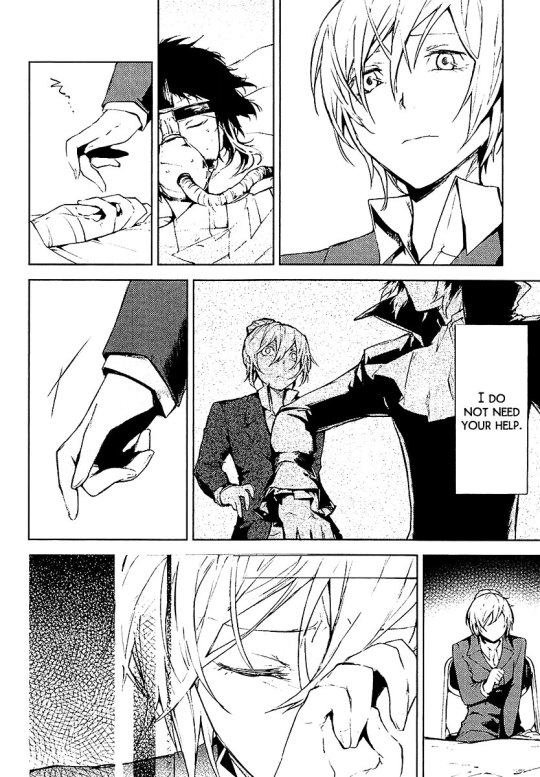
Remember this scene from Chapter 14? Higuchi reaches out to hold Akutagawa’s hand but then pulls back because she remembered him saying that he doesn’t need her help. Now, you could argue that holding the hands of injured loved ones is a gesture of closeness, a way to show them your support, a way to tell them that you’re staying by their side. And Aku doesn’t want this support, so that’s why she retracted her hand. But something bothers me here. In this scene it looks like Aku slapped Higuchi’s hand away, doesn’t it? And then he says, he doesn’t need her help, instead of support. I know, you could say support and help are almost the same. But to me, help is something that you do more “actively”, while support can be something passive. What if Higuchi’s hand represents this “active” help? And what would actively help Akutagawa in this very moment? A healing ability for example. Coincidentally, in the panel before, Hirotsu asks Higuchi what power she posses to make them [the black lizard] obey. Is this a hint that there is a hint about Higuchi’s ability in the next panel? Maybe. But let’s look at the next panel. It’s the title page of this chapter.
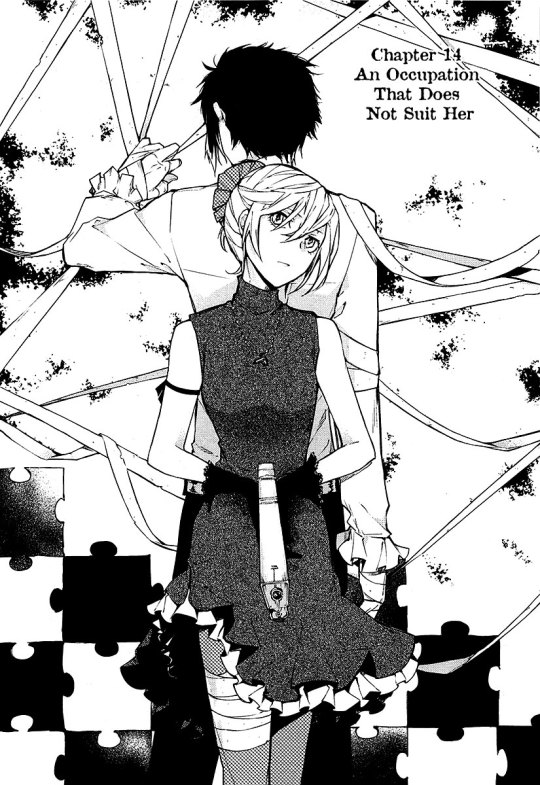
As you can see, Higuchi has a bandage wrapped around her leg and they seem connected to Akutagawa. In this chapter, it is revealed that Higuchi contemplated about leaving the Port Mafia but her reason for staying is implied to be Akutagawa. This is perfectly symbolized by the bandages in this title page. The bandages coming from Akutagawa are holding her leg back, stopping her from walking away from the PM. But maybe there is a second interpretation? If you’re looking at Akutagawa’s left hand, the bandages are starting to come off. What if this means Akutagawa is healing and doesn’t need the bandages anymore? Instead it wraps around Higuchi’s leg, restricting her movement. What if Higuchi’s ability allows her to help someone else (doesn’t have to be necessarily a healing ability) but in exchange she needs to sacrifice something? Anyways, I think she has an ability which allows her to help other people in a non-combat way. With this in mind, I was looking through several works of Higuchi Ichiyo, searching for something that “fits”. Meaning that I was looking for parallels and themes in irl Higuchi’s stories that could be “converted” into an ability. Just like the coat that the protagonist of Rashomon stole in order to now die of hunger was used as Akutagawa’s ability which seems to be able to eat everything, or like the wish that one’s brother does not die in war in Thou Shalt Not Die became Yosano’s ability and serving as a basis of her background story. Anyways, I’d like to present the works that could be used for Higuchi’s ability and draw some parallels.
1. The Thirteen’s Night
The story revolves around a poor woman, called Oseki. Thanks to her marriage to a rich man, her family was able to live a better life and her brother found a job. But on the thirteenth night of the ninth month of the lunar calendar (one of two special nights for moon viewing), Oseki visited her parents with the intention on asking her parents for approval for divorcing her husband. Before entering, she overhears her parents talking about how lucky they are that they have such good children who don’t cause trouble and that they are very thankful for this marriage. Hesitating at first, she finally goes in and admits that she wants to divorce her husband because he abuses her mentally. He insults her constantly and tells her that she's worthless, stupid, and uneducated. Her mother is outraged. But her father, even though he acknowledges her suffering, reminds her what her husband has done for this family and that she would lose her son since women couldn’t get custody of their children after a divorce at that time. Agreeing with her father, Oseki decides to go back to her husband:
“It was selfish of me to think of a divorce. You're right. If I couldn't see Tarō, there'd be no point in living. I might flee my present sorrows, but what kind of future would I have? If I could think of myself as already dead, that would solve everything… Then Tarō would have both his parents with him. It was a foolish idea I had, and I've troubled you with the whole unpleasant business. From tonight I will consider myself dead — a spirit who watches over Tarō. That way I can bear Isamu's cruelty for a hundred years to come.”
– In The Shade of Spring Leaves, translated by Robert Lyons Danly
Just like BSD Higuchi contemplates leaving the PM, the protagonist here wants to leave her husband. The PM is like the husband. It allows her to support herself and probably her family (at least we saw that she has a sister). But there is constant abuse. Akutagawa is clearly the biggest source of abuse that we can see. But it’s not only him. In Chapter 14, Mori asks her if she is really suited for this job. Telling her indirectly that she is useless or that she is too weak for the PM. Later, you can see the Black Lizard doubting her capabilities, even threatening her. But just like Oseki she stays because of a loved one. What really concerns me is Oseki saying that she will consider herself as a dead spirit watching over Tarō. What if Higuchi, in order to use her ability, has to sacrifice part of her lifespan? Or maybe she loses a feeling? Like e.g. she loses the ability to feel happiness, making her a bit more dead inside? If you draw this parallel, you could also say that when ‘consider myself dead’ is the condition of the ability, then ‘watching over Tarō’ is a hint to Higuchi’s ability. An ability that allows her to watch over and protect her loved ones? This theme fits Higuchi perfectly, since a big topic in Higuchi’s story line is how she wants to help and protect Akutagawa. So it makes sense that her ability might be something that would help him (**intensely squinting at the recent events in the manga, especially chapter 88**). Moving on to the second possibility before the pain starts to set in.
2. Takekurabe (literally: "Comparing heights", "Child's Play" in the Robert Lyons Danly translation, "Growing Up" in the Edward Seidensticker translation)
Now this is considered as Higuchi Ichiyo’s masterpiece. So the chances are high that the ability is based on this story. The story accompanies a group of children who live next to the Yoshiwara quarter. There are two rival gangs: the main street gang (’omote-machi’), lead by Shōtarō, a cultivated young boy who is the grandson of the owner of a pawnshop, and the back street gang (’yoko-chō’), lead by Chōkichi, the impulsive firefighter’s son. (Maybe a parallel to the ADA with (cultivated) Fukuzawa and the PM with Mori who’s a doctor which belongs into the same category of occupation as firefighters?). Among the main street gang, there was Midori, popular and pretty, who lives in the brothel where her sister works. Shōtarō probably has a crush on her. But Midori probably has feelings for the other main character, Nobu, the son of a Buddhist priest. Even though he returns her feelings, he distances himself from her out of his self-consciousness. Later he joins the rival gang after repeated request by Chōkichi. Anyways, they spend their days very care-free, attending school, playing with each other after school. One day, some conflict arises between the gangs and Midori, while protecting someone else, gets slapped by Chōkichi with a sandal. He then proceeds to tell her that their gang is backed by no other than Nobu. Midori feels humiliated and stops going to school. Soon she also stops playing with the other children. After some time passed, Midori is seen with her hair all done up. She has become a distant, lady-like young woman. This probably means that she got her first period and is old enough to become a prostitute or that she just had her first client as a courtesan. Little by little, the children grow up. Nobu is sent off to be trained as a priest and Shōtarō has come to accept the responsibilities of his family’s shop.
There are several themes in this story that I’d like to point out, namely unrequited love, Midori’s transformation and underlying unchangeable fates. The first one is obviously a big theme in Higuchi’s story. Midori and Nobu are unable to express their love for each other because of their positions in life. Just like Higuchi is unable to express her feelings for Akutagawa. If you want some hope, AkuHigu shippers, maybe Aku has also feelings for Higuchi but is still very confused and self-conscious about it just like Nobu. Anyways, because of their positions in the PM, it would make everything very complicated if Higuchi confessed. Additionally, Midori feels like she was humiliated by her love when she got slapped by that sandal. I’m sure that Higuchi gets humiliated by Akutagawa a lot. The next theme is Midori’s transformation from a tomboyish to a lady-like, distant woman. We all know Higuchi looks really badass in her suits. But again, look at the title page of chapter 14. Higuchi is dressed up all prettily and lady-like in a dress, and her hair is done all up. Just like Midori after her transformation. Midori’s transformation stands for Midori accepting her occupation as a prostitute even though she doesn’t want to. In this chapter, we see that Higuchi has accepted her job in the PM, even though she doesn’t want to do this job. At the end Shōtarō sings the following:
"Growing up,
she plays among the butterflies
and flowers.
But she turns sixteen,
and all she knows
is work and sorrow."
– In The Shade of Spring Leaves, translated by Robert Lyons Danly
I don’t know about you guys, but to me that necklace that Higuchi is wearing in that title page looks like a butterfly to me. This is really farfetched but maybe this could be a hint about when Higuchi joined the Port Mafia? However, the biggest theme in Takekurabe is the underlying unchangeable fate of the children. Shōtarō was destined to become the next owner of the pawnshop, Nabu was destined to become a Buddhist monk and Midori would become a prostitute. Maybe this gives us some insight into why Higuchi joined the PM? Maybe one of her parents was a PM member? I also like to think that since Aku is in the PM, since she wants to be with him, she can’t but stay in the PM, and this is her fate. Nevertheless, fate is a central theme in Takekurabe. This is the reason why I think, if the ability is based on this story, Higuchi’s ability would be something like changing fates. Changing fate of someone else but in return she must sacrifice something.
Okay, so this post has become quite long. But I still wanted to mention two other stories Yamizakura (Flowers at Dusk) and The Sound of the Koto where I saw a lot of parallels. I just want to briefly tell you the story of The Sound of the Koto. In this story a woman abandons her son in order to leave her husband who has a bad reputation. The husband then turns into an alcoholic and dies later at a party because of alcohol intoxication. The boy becomes hardened to the world, despises his mother for leaving them, and even contemplates suicide. The story shifts then to a woman playing the koto. I want to give you an excerpt for the end of this story:
“On this night the sound of the woman’s playing helped another to be reborn. Through fourteen springs and fourteen autumns, the boy had been buffeted by the rains. His heart had gradually toughened until it had become as hard as stone. No arrow could penetrate it. He seemed destined to follow the example of his father, to die among the fields or in the mountains, where his remains would be bleached by the elements. Some were convinced the boy’s life would end in prison chains, while his bad name spread to every roadside.
But now, at once, the tenderness buried in his heart was freed by the midnight strains of the koto. For the first time in many years, he felt tears come to his eyes. Or were they jewelled drops of dew? He would not exchange them for anything.
He, who had known neither love nor compassion, and who had no idea what the player of these refrains could even look like, felt a moment of happiness as the music drifted over the garden wall. […]
[…] How could a stormy wind blow now? The clouds in his heart had disappeared. Once more the woman began to play. The sound of the koto would be his friend for a hundred years, the seed for a hundred years of yearning. He had entered a world where a hundred different flowers wer in bloom.
– In The Shade of Spring Leaves, translated by Robert Lyons Danly
This boy somehow just reminds me so much of Akutagawa. Just like this boy, without any parents and home, wandering around in this world, Akutagawa has become hardened to the world. I’d like to think that Higuchi’s ability could free Akutagawa from his pain, just like the sound of koto does for this boy.
So, now I said everything I wanted to say, I guess. If there is really anyone reading this and reading this until here, thank you so much! I appreciate it very much that you kept reading even though my thoughts are probably quite chaotic. I’m sorry if there are any grammar mistakes or weird sentence structures or anything like this. English is not my first language. I’m very happy, if you could point out any mistakes or have any suggestion for improvement. Lastly, I just want to remind you that these are my thoughts, I love discussing so feel free to comment your thoughts but I’d like you to keep in mind that there is not necessarily a wrong or right, theories are theories, interpretations are interpretations. Everyone has another interpretation. They can only be proven wrong by Asagiri sensei himself. Until then just keep the discussions friendly and tolerant towards other people’s thoughts and opinions.
Sources:
All manga panels used in this post are from easygoingscans
Higuchi Ichiyo (樋口 一葉)
Higuchi Ichiyo: "In the Shade of Spring Leaves"
In The Shade Of Spring Leaves: The Life Of Higuchi Ichiyo, With Nine Of Her Best Stories, translated by Robert Lyons Danly
In the Shade of Spring Leaves – Ichiyō Higuchi, Part 1
“Flowers at Dusk” and Other Notes – Ichiyō Higuchi, Part 2
“Encounters on a Dark Night” and Other Notes – Ichiyō Higuchi, Part 3
“Child’s Play” and Other Notes – Ichiyō Higuchi, Part 4
HIGUCHI ICHIYŌ: BADASS WOMEN IN JAPANESE HISTORY
The Thirteenth Night (Wikipedia)
Female Subject, Interrupted in Higuchi Ichiyō's "The Thirteenth Night"
GAME OF TRADITIONS: TRADITION IN THE THIRTEENTH NIGHT AND DIARY OF A MAD MAN
HIGUCHI ICHIYŌ IN MODERN JAPANESE AND EUROPEAN DRESS: Modern Japanese versions (gendaigoyaku) of Higuchi Ichiyō’s Takekurabe and their Relationship with English, Castilian Spanish and Catalan Translations
Separate Ways Summary
Literary Analysis of “Separate Ways”
Flowers at Dusk
Nigorie (Wikipedia)
From the Margins of Meiji Society: Space and Gender in Higuchi Ichiyō's "Troubled Waters"
#bsd#bsd manga#bsd theories#bsd theory#bsd higuchi#bungou stray dogs#bsd akutagawa#bsd thoughts#bungou stray dogs theory#bungou stray dogs analysis#bsd analysis#bsd characters#bsd chapter 88#bsd mori#bsd hirotsu#bsd black lizard#port mafia#bungo stray dogs#bsd abilities#higuchi theory#Q overthinks again
429 notes
·
View notes
Text
Let’s talk: Serendipity with a side of 4 O’Clock and other guest appearances
by Admin 1 and 2
We’ve been meaning to write a analysis/theory/discussion on Serendipity for the longest time, especially after I once mentioned in a previous post how I think the song can be interpreted in a way that works for both vmin and namjin. So, while I’ll add my thoughts in regard to the latter, the vmin portion is more based on conclusions and thoughts Admin 2 arrived at. I think their idea presents a perspective I haven’t really seen anywhere else before yet, so I think it’ll hopefully be interesting.
As with any song analysis/discussion/theories, this only represents some of our interpretations which don’t have to be right and no one is meant to take this as gospel. Art is subjective and while we all listen to the same song, read the same lyrics, our understanding and thoughts may/will vary, so you might not agree with any of what we say and you are not obliged to do so. This is just meant as a discussion, some pondering, and perhaps we can discover something along the way that we haven’t considered yet.
With that being said, let’s get into it.

Additional preface: this post will work off of the assumption that both vmin and namjin have romantic feelings for each other and/or are together. If this isn’t an angel you’re interested in reading about, this likely isn’t the post for you. Furthermore, if you’d prefer to put on your delulu hat for the duration of this post, please take a moment to put it on now. Enjoy!
All lyric translations are from doolset.
Serendipity is the opening song on Love Yourself: Her, the first album of the Love Yourself trilogy, and was released September 18th 2017. Of all the members, Namjoon is the only one credited as lyricist on it along with four other people (two outsiders, Slow Rabbit and Bang PD). Based on that we can say that Namjoon definitely had a big influence of the content of the lyrics and the story they tell so analyzing the song in the context of Namjoon makes sense. But at the same time the song is Jimin’s solo so I don’t think it is that farfetched to think that he kept Jimin in mind when writing the lyrics, and judging by how attached vmin, and especially Tae, seem to be to this song, thinking that there might be more to it than just the fact that it’s Jimin’s solo, again, seems like a sensible conclusion to arrive at. In 2020 Tae even used a moment where he recommended Serendipity (as part of the digital Map of the Soul ON:E Exhibition which, by the way, opened on Jimin’s birthday) in order to wish Jimin a happy birthday.
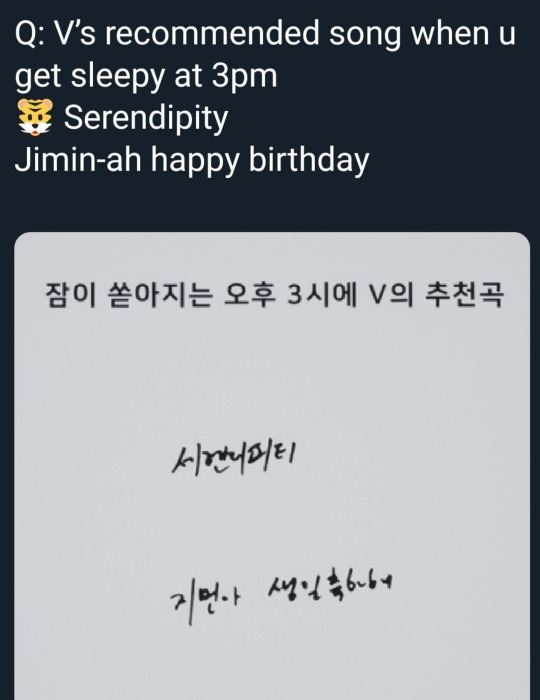
Serendipity /ˌsɛr(ə)nˈdɪpɪti/ as: the occurrence and development of events by chance in a happy or beneficial way.
Looking at the meaning of the title and the big focus on the concept of destiny displayed in the lyrics, I think it makes a lot of sense in the context of Bangtan. The members themselves have spoken about how it was meant to be them, these seven men, and just think about how many different factors had to work in their favor for them to end up not only as trainees for BigHit but also as members of BTS. If Seokjin hadn’t gotten on that specific bus and gotten off on that station the BigHit staff might’ve never seen him and approached him, if Tae hadn’t gone with his friend to the audition and hadn’t gotten talked into auditioning himself, he wouldn't even be an idol at all, and if Jimin’s dance teacher hadn’t encouraged him to audition he wouldn’t have come as trainee to Seoul either. And if one of the BigHit producers hadn’t seen Namjoon, hadn’t shown him to Bang PD, BTS wouldn’t have been created at all. As the lyrics themselves say:
이 모든 건 우연이 아냐
All this is not a coincidence
Timeline wise we think Serendipity is about two different moments in time depending if you look at vmin or namjin. For the latter I’d say it’s about the beginning of their relationship which, if namjinists are right in our thoughts and theories, would put this sometime 2013. Meanwhile for vmin, Admin 2 actually thinks it would be 2016, more specifically the time of the dumpling incident, so before FIRE was released. This also leads us to the main idea that Admin 2 arrived at and thought of, being that Serendipity and 4 O’Clock tell two sides to the same story, as in Tae in 4 O’Clock is the one waiting for the other person, who describes the moment in time and the feelings he had when that person came to meet him. Meanwhile Jimin is the one who came to meet him, who asks him to love him, who cried because of his feelings and who’s telling him about those feelings and thoughts (as displayed by the sentiments of Serendipity). Namjoon also wrote both, and he knew as many details of the incident as Tae was willing to share with him which, seeing how filled with emotion and deep the lyrics to 4 O’Clock are, I’m sure were rather extensive. How else would he has been able to write such beautiful lyrics?
Actually, to sidetrack for a moment, Admin 2 thinks that it’s not a coincidence that Namjoon isn’t just on 4 O’Clock was writer but also as artist, that in a way he also verbalizes his own pain/troubles through his verse even though, as far as we know, namjin never had anything that would be like the dumpling incident, but in this sense it’s more about what the incident represents rather that the literal event. As in, for vmin this was the big fight they had, a majorly significant moment that brought about a change in their dynamic and bond, and according to them it was their last big fight in general. Like a moment that was destined to happen in order to allow for them to later down the line grow into what they are today in connection to each other, but we think it was also a moment in which, while they might’ve realized and opened up to each other about their feelings, it was also when they had to realize that despite there being more to their feelings, it wasn’t the time for it.
As the lyrics in Serendipity say:
설레는 만큼 많이 두려워
As much as my heart flutters, I’m afraid
운명이 우릴 자꾸 질투해서
because the destiny keeps getting jealous of us
너만큼 나도 많이 무서워
As much scared as you are, I’m, too, scared
When you see me
When you touch me
Destiny in this case represents their career and them being idols, being part of a group destined to become the phenomenon and the superstars they are today, meaning that this destiny stood in the way of their bond in a romantic sense. They had to prioritize this destiny over their feelings, over wanting to be with each other, because they were afraid of the repercussions that could otherwise bring upon them (as well as the other members). Besides, they could also look at namjin who, in a way, came before them. If theories are right and namjin were together sometimes starting in 2013, they had to eventually split romantically for the greater good of the band, so if their relationship had to take the back seat, so to speak, destiny having gotten in their way (gotten jealous of them), how could vmin know it wouldn’t be the same for them? Besides they already had so much going on with Jimin’s feelings of jealousy due to Tae’s Hwarang hyungs, Tae’s work on the drama keeping him away from the band and exhausting him even more, and the sad things still to come which they couldn’t know at that time just yet.
From Sweet Night we know that they had a first chance that Tae didn’t take, that he couldn’t have known that one day he would wake up and feel more for his best friend, as in Jimin, even though, deep down he realized that he’d long reached the shore already. So, in that park that night the conclusion they arrived at was that while they couldn’t move forward with their feelings (because perhaps Tae didn’t even know just yet the extent of his own), he realized that Jimin is an angel after he told him that he at least wants to be his source of strength which subsequently unleashed arrows of pent up emotions from his heart. So while it was a positive event in sense of it bringing clarity, to a certain degree, about their feelings for each other, it was also one of sadness because they knew they couldn’t follow those feelings. Remember how when performing 4 O’Clock Tae cried in the end? If it were a song just reminiscing about two friends making up at the park after a fight over them being stubborn about dumplings, would he really feel saddened enough to cry, to get to that level of emotionality?
Later in the song the lyrics say:
이젠 곁에 와줘
Now, please be by my side
우리가 되어줘
Please be us
I don’t wanna let go no
그냥 맡기면 되는 거야
We can just leave it to fate
말 안 해도 느껴지잖아
We can feel it even if we don’t talk
Here the important part would be the line about how they can leave things up to fate, which can be interpreted as even if things might not be what we want them to be right now or anytime soon, they will happen eventually because that’s how it’s meant to be. The lyrics generally make a lot of mention of how their love is destined, how their happiness together has been destined since the universe was first created. So it shows a sense of trust that regardless of what will happened, or might’ve happened in the past, they will find their way back together eventually (in a romantic sense). Like, again, in Sweet Night where Tae didn’t use his first chance but hopes he’ll get a second one and, judging by the hopeful tone of the song and everything that we know currently, it looks like he got it and it worked out in their favor. The same, I think, can also be said about namjin.
Looking at the lyrics of Serendipity, the idea of them being fated even though their meeting was serendipitous, Namjoon is basically telling us that here, too, he believes that his connection to Seokjin, if we are correct in the interpretation that Seokjin is the lover hinted at throughout different songs on the Love Yourself albums, was also meant to be and that it will remain as such even if they had to step away from each other romantically, that while they used to be scared back in the day to be together, to open up to each other about their feelings, it still was destiny and that it would work out in the end. Looking at how much they’ve influenced each other, how Namjoon even went as far as saying that Seokjin is his muse/inspiration in a way, would such conclusion really be all that farfetched?
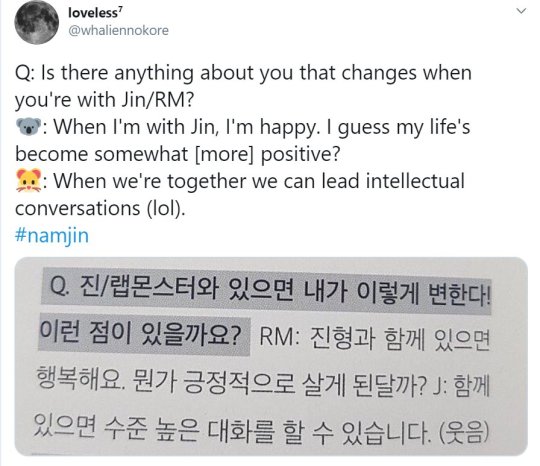
The first line of the quoted verse also reminds me of the same sentiment that Jimin wrote about three years later for Friends in which he wrote:
언젠가 이 함성 멎을 때 stay hey
Someday, when these cheers die down, stay hey
내 옆에 함께 있어줘
Stay with me by my side
영원히 계속 이곳에 stay hey
Forever, keep staying here, hey
We know that forever/eternity is a big thing when it comes to Jimin and Tae which we’ve seen as early as 2014 with the picture of their intertwined hands that Tae posted on twt with the wish of them keeping going together for a long time and then with Jimin’s addition of saying forever. Later during Bon Voyage 4 he also said that again, how he wants to live with his lovely Taehyungie forever, and years before that how he wants them to be together until they’re grandpas.
So, in a way, it isn’t just destiny they trust that will be in their favor, but it’s also their active wish and “work” in that direction, that it’s not just something a higher force has foreseen for them but it’s also something they consciously want for themselves as well. All because of that serendipitous fact that they ended up as trainees and members of BTS.
넌 내 푸른 곰팡이
You’re my blue mold (penicillin)
날 구원해 준
that saved me
나의 천사 나의 세상
My angel, my world
Here is where we can draw two connection directly to Tae and Jimin, one because of something Jimin said about Tae years prior and the other due to the fact that as recently as the second half as 2020 (DICON Magazine) Tae said he had Jimin saved on his phone as Penicillin. We also know that after the song came out, Tae made a phone case for Jimin with the word penicillin on it which Jimin proudly used and showed off.
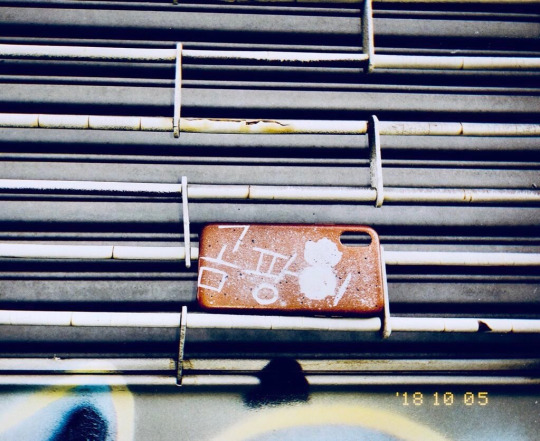
Furthermore penicillin itself is something that can save you, and while we might not know from what, exactly, Jimin needed to be saved, he did say that Tae is more than just his close friend, he is also his savior.
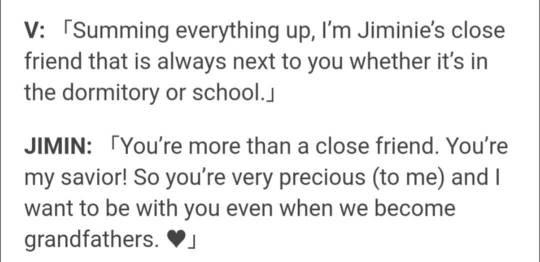
As for Namjoon, there was certainly a time where he would’ve needed someone to save him, from himself and his dark, less than life positive, thoughts (as displayed by the lyrics in Always) but also the world around them back in 2015/16 where he was seen as the worst of the worst for things he’d said that had been purposefully misconstrued and misunderstood, as well as lyrics he’d written which, again, where taken to mean things much different from what he actually tried to say. While there is nothing I can use or base any assumptions on that Seokjin would be the one/was the one who saved him, contextually, I don’t think it would be farfetched that he did help him and was there for him during that time, much the way the other members surely were too. Based on what we know about Abyss and the background of that song, we know Namjoon helped Seokjin in some ways with it, so if Seokjin came to him and spoke to him about the hard time he was having in 2020, it isn’t that out there to think that Namjoon might’ve done the same back in 2015/16, and during other times between when they first met until Namjoon wrote these lyrics, right?

난 네 삼색 고양이
I’m your calico cat
널 만나러 온
that came to meet you
Love me now touch me now
Calico cats are very rare, and usually you’ll only find female calico cats, meaning that male ones are even more rare than that. Looking at Namjoon as a person, I’d say he is a very rare type of person as well, I mean, how many teenage underground rappers turned idol group leaders who might also be queer and is also a literal genius do you know off the top of your head? Furthermore calico cats are seen as lucky cats in many cultures and places so in this sense Namjoon/Jimin would represent something lucky/positive that came to their partner which, if we again look at things that were said over the years, Jimin did say that Tae is the happiest when he’s with Jimin.
As for Namjoon and Seokjin, this could be connected to the fact that Seokjin was thankful that Namjoon is on their team, their ally, instead of someone from another group, thus seeing it as luck that they are together (Rolling Paper FESTA 2020), like he is their good luck charm that played a major role in them getting to where they are, so to speak. And yes I’m aware that he said that three years after the song was released but it wasn’t the first or only time he ever voiced such sentiment. Seokjin has underlined how much he admires Namjoon’s abilities as leader and lyricist many, many times over the years.
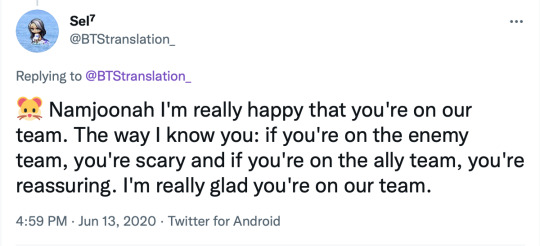
“Our leader, RM. This guy is amazing. There are 2 more older guys than him, yet he is great as leader. I want to thank our leader personally.” -- Seokjin as a concert which, judging by their hairstyles (and the use of Namjoon’s old artist name) must’ve been some time around Dark & Wild perhaps?
As a side note, the mention of calico cats reminds me of a picture Seokjin posted for Namjoon’s birthday in 2019 (so two years after Serendipity had already come out) in which Namjoon is seen asleep while sitting and hugging a calico cat plushy. You’ll recognize both the plushy and the ARMY B*mb hat as part of the VCRs for 4th Muster in 2018. So I’m mentioning this as more of a cute thing rather than some kind of definitive sign of any sort really. By the way, that same cat plushy can also be seen when Tae lies sleeping and Jimin sits next to him singing the calico cat line and places the plushy on Tae.
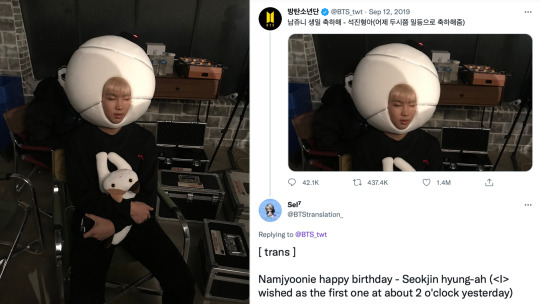
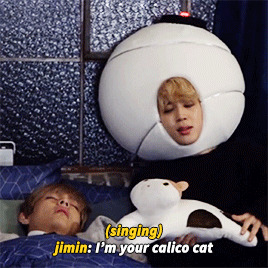
But, what I think is, for me at least, the biggest hint toward Serendipity being, to a degree at least, about/inspired by vmin is the fact that early in 2017, February more specifically, Jimin and Tae both called each other their soulmates during one of their fansigns. And what are soulmates if not two people destined to meet and be with each other, two people quite literally meant for each other? And here Jimin is singing a song about how his love for this person and his happiness with them was fated, that destiny had this planned for them regardless how scared they may be and how destiny (outside factors) might be jealous of them (keep getting in their way).
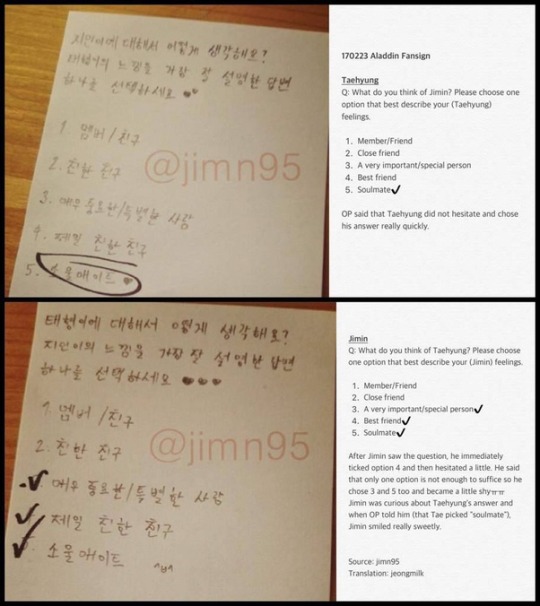
Furthermore, isn’t it curious how this song, specifically, is written as gender neutral instead of with female pronouns like their songs in the past or even Outro: Her off the same album? Yes, Namjoon explained in their interview with Billoard that this decision was one he made because these rare moments and special things in life are something that transcend genders, cultures and barriers between people, and love is also something that doesn’t care about genders, in this case love and destiny don’t care about the fact that they are all the same gender because they are fated anyway, they are soulmates, each others fated person, and their happiness is meant to be in one way or another. Together.
74 notes
·
View notes
Note
Ooh anything about linguistics and/or Chinese linguistics that interests you- what do you find most interesting?
Ooooo thank you! First let me apologise for the lack of rigour i.e. sources - I am ILL.
HMMMMM ok...let me talk a little bit about one thing I find fascinating - the idea of 'linguistic complexity'. It's an interesting topic that a) demonstrates the failures of linguistics that only takes Indo-European languages into account; b) demonstrates how a conflation of linguistic and moral judgements leads to absolute chaos; and c) proves that sometimes the purpose of all models and hypotheses is to be a useful aid in description, and not to be 100% accurate. Which means that multiple models can exist at the same time. Also, it shows just how cool Classical Chinese is.
I'm going to make this into two posts because I have been asked to wax lyrical on this stuff twice...this one will be a general overview of what linguistic complexity is and some of the issues around it, and the other post (@karolincki 's ask) will be an overview of these issues as pertaining to Modern and Classical Chinese.
Linguistic complexity: an introduction
What is linguistic complexity? Basically what it says on the tin: how 'simple' or 'complex' is one language in relation to another. If you automatically think that sounds dodgy - aren't all languages equally complex? what is a simple language? etc - just hold on. We'll get there.
A very important starting point: complexity here only refers to linguistic complexity. There are many ways to measure this, but broadly speaking it refers to the amount of stuff in a language a learner has to deal with. Are there genders? Well, that's more complex than not having any, because it's an extra thing to remember. Do you have to express whether the information you're conveying is something you personally experienced or hearsay? Again, more complex than not. Different tenses? Essentially, you can look at complexity like this: if you were describing this language or putting it into a computer program, what is the minimum length of description you would need? The longer the description, the more complex the language. In a standard understanding of complexity, a language like English is more complex than a language like Vietnamese (English has more tenses, moods, conjugations, irregularity...), and a language like Georgian is more complex than a language like English (Google a single verb table of Georgian and you will see what I mean).
(this will be long)
What complexity does not mean is anything to do with the cognitive abilities of the people who speak it. It doesn't mean that people who speak English are unable to conceive of the difference between a dual and a plural (2 apples and 3 apples), just because the language doesn't mark it. It doesn't mean people who speak Chinese are unable to conceive of the past conditional ('I should have gone...') just because they don't have a separate tense for it. It doesn't mean Italian speakers don't know whether they experienced the thing themselves, or heard about it from someone else, just because they don't have a set verb ending for it. All linguistic complexity means is what the language requires you to express.
I'm putting this out there very clearly because this sort of thinking is bound up in a lot of racist ideas and ideology. You'll have heard of the Sapir-Whorf hypothesis? Unfortunately named, since they never really worked together, and Edward Sapir was actually a relatively cool dude for the time who argued against linguistic relativity - i.e. the language you speak determines how you think. Yes, in the 19th (and much of the 20th) century, when certain linguists referred to 'simple' and 'complex' languages that is what many of them meant: speakers of a simple language are 'simple', and a complex one are 'complex'. But there was a huge backlash against these racist ideas, and that backlash was hugely influential is shaping the direction of typology (the branch of linguistics which is broadly concerned with these sorts of questions). More on that later, but for now: please understand that when I say linguistic complexity, I am not implying a single thing about the people that speak it.
Back to complexity. Of course language, like any system, is made up of moving parts: you don't just need to consider how many parts it has, but also how interdependent they are, whether they interact with each other in a predictable way, how likely they are to change. You might also want to consider how easy the system is to learn for somebody who has never used it before. And then, of course, languages are more complex still because they are not machines, but ever-changing things: do you count a rule like the conditional inversion in English, which only applies to a total of three verbs? Is that less complex because fewer verbs use it - and therefore you need to think about it less - or does that make the system more complex because you need another, meta-rule to say when you need to use it and when not? What about irregularity? Is a language like English that doesn't have many rules but has a sizeable amount of 'irregular' verbs more or less complicated than a language like Swahili which has a lot more rules, but follows them assiduously? And what happens when some people use one rule and others don't - do you count those as the same language (lumping), which may render the grand overview less accurate, or do you count them as totally separate languages (splitting), in which case when do you stop?
Hmm. Complexity. Is. Complex.
Those are a lot of factors that need to be considered here. Even saying something is 'irregular' doesn't mean very much without further quantification. For example, if I say that the 'irregular' verb ring goes to ring, rang, rung in English, you can very easily find other verbs which conjugate similarly: sing, sang, sung etc. So is that really irregular? Or is it just another, less productive rule? But then if it's a rule, why do we say fling, flung, flung and not yesterday I flang the ball? What's going on???
And what about 'total' irregularity, so called 'suppletion', where (and this is a very scientific explanation) a random non-related word just seems to appear in a paradigm, like it's got lost on the way home? Like I go, I went; like to be, I am, he is, I were; like good, better, best. Ok, so is the irregularity in I go and I went somehow....more irregular than irregularity in I sing and I sang? Uhh. Ok. And then is the irregularity in bad, worse, worst somehow more irregular than better and best, because at least for better and best you can see the -er and -st endings?? Finally, what about a 'spoken' but very predictable irregularity, such as the way we have a reduced vowel in 'says'? Where do we count that? Is that more irregular, or less irregular? Is it maybe 33% irregular?
I think you get the point. And of course all of this becomes more complex when you start to consider the interaction of lots of different systems at once. What about tone? If you have regular tone like Chinese, most people would agree that it's more complex because it's an added thing. But tone probably only developed in part as a response to losing some really important sound contrasts that other languages have kept...and also there is no possibilities of 'irregularities' in tone the way there are in something like verb conjugation...you can't just have a random sixth tone. And then what about syntax? If you have lots of very complex word ordering rules, is that more or less complex than a language where you have to rely on the human being to use pragmatics to infer what the ever loving fuck is going on?
Yeah. This is sort of just one of those things where every year a new linguist comes up with a spicy new matrix to 'measure' complexity and then everyone shits on them in journals and then comes up with their own idea which is promptly shat on. I don't know either.
Ok, so how is this relevant to Chinese?
To answer that question we need to circle round a bit to the history of typology that I vaguely alluded to earlier. At various points - depending on how racist the linguist in question was - people in the 20th century were starting to realise that all of this stuff about 'complex language = complex civilisation / complex thought' wasn't quite as water-tight as they'd hoped. Perhaps it was their better judgement, but it's also likely to have been influenced by a lot of contact suddenly with Native American languages - many of which are vastly complex by literally any metric you could possibly imagine, but the people speaking them were not colonising other countries and building amphitheatres and all of those necessarily, comfortingly European ideas of 'civilisation'. This movement away from such racist ideology, even if it was fuelled in part by a different type of racism, meant that suddenly everyone was very wary about making statements about linguistic complexity at all. It smacked of all the things they were trying not to be associated with.
I'm going to quote some Edward Sapir here for no other reason than I think it's really unfortunate that he's most famous for something that has the potential for incredibly racist ideology that he literally never said:
'Intermingled with this scientific prejudice and largely anticipating it was another, a more human one. The vast majority of linguistic theorists themselves spoke languages of a certain type, of which the most fully developed varieties were the Latin and Greek that they had learned in their childhood. It was not difficult for them to be persuaded that these familiar languages represented the “highest” development that speech had yet attained and that all other types were but steps on the way to this beloved “inflective” type. Whatever conformed to the pattern of Sanskrit and Greek and Latin and German was accepted as expressive of the “highest,” whatever departed from it was frowned upon as a shortcoming or was at best an interesting aberration. Now any classification that starts with preconceived values or that works up to sentimental satisfactions is self-condemned as unscientific. A linguist that insists on talking about the Latin type of morphology as though it were necessarily the high-water mark of linguistic development is like the zoölogist that sees in the organic world a huge conspiracy to evolve the race-horse or the Jersey cow.'
People generally began to get the hang of it after this, and stepped away from linguistic classification at all. There was a broad consensus that that sort of thing was done with, a thing of the past. It's kind of funny, because of course people's unwillingness to look at the complexity of language because 'all people are the same' shows that they still think language and culture/cognition are intimately linked! It was done out of a desire to not be racist, but you can't even reach that conclusion unless you have a sneaky secret bit of bioessentialism going on in your sneaky little brain. Because if the complexity of language doesn't reflect the complexity of your thought, why would it matter whether some systems are bigger than others? That they had more parts?
It literally wouldn't matter at all..
So what happened next? Linguists started to revisit these old linguistic classifications and ideas of complexity, but in the hope of proving, instead, that actually all languages were equal. You can definitely see the theoretical aims here: not only is a good from an ideological point of view (again, if you still equate linguistic complexity to complexity of thought), but it's also quite handy if you believe that all human babies approach language learning with the same biological apparatus ('Universal Grammar', if you believe in that, and other cognitive principles). If all babies have the same built-in gear, you sort of want the task they are given to be of roughly the same magnitude. That's one of those things linguists like to call theoretically desirable - which just means it would be neat if it did.
We're getting to Chinese. I promise.
So how you could make systems so vastly different as English and Georgian and Chinese roughly the 'same' level of complexity? One answer is irregularity: languages with huuuuuge verb and noun declensions like Georgian tend to have very little irregularity, where languages with less extensive systems like English tend to keep it around for longer. There are lots of reasons for this I won't go into, but it's a general trend. Irregular systems are more work for the brain to remember, which, predictably, is more 'complex' for a learner to acquire. Compare a language like English and German: German may have more cases and declensions and rules, but once you learn them...that's it. Compare that to English, where you'll be learning phrasal verbs and prepositions as a second language learner until the day you die (and possibly beyond). It's a different type of 'complex', but it's still deserving of the title.
That obviously doesn't work for a language like Chinese. Chinese has no conjugations, and so can't possibly have any irregularity in the same way. But fear not: there are lots and lots and lots of ways in which languages often exhibit what might be called 'complexity tradeoffs': languages with complex tone, for example, almost always have simpler sound systems elsewhere, and many languages with complex case arrangements tend to have free word order. One thing is complex, another...simplex (a word unfortunately genuinely in use).
This seems nice. We like this. It means that the different parts of the same system may be differently sized, but the whole system in total is about the same as any of other language. There’s just one problem: this isn’t how languages seem to work.
For every example of a complexity trade-off you can find, there are other languages which don’t have any such ‘trade off’ at all. There are plenty of languages where grammar is complex and the sound system is complex; or languages like Icelandic and German where there are cases but fairly rigid and fixed word order; or other cases where there is a huge amount of irregularity but also crazy verb systems, and so on. A language like Abkhaz has supposedly 58 consonants in the literary dialect: but it also has insanely complicated grammar. No trade-off there. Finally, it has long been presumed that whilst verb morphology etc is simpler in languages like Chinese, syntax would be more complicated: recently, a number of studies have proved exactly the opposite. Both, in fact, are simpler.
In conclusion, where does this leave us? Whilst the idea behind complexity trade-offs is well-motivated but not totally sound, and whilst these do not always seem to be present in the way you might hope, what this does do is force us as linguists to question whether we have spent enough time considering the types of complexity that are present in languages like Chinese, and how we reconcile that with more ‘familiar’ complexity. It’s interesting to think about because it shows what happens when you fail to consider these things.
That’s all for the overview on linguistic complexity today!! I’ll talk specifically about complexity in Chinese in the next ask, because this is already very long. Be aware, I’m not going to give you any answers necessarily - these questions are way above my pay grade - but boy can I give you some thoughts.
#chinese#linguistics#langblr#lingblr#linguistic complexity#meichenxi manages#askies#oh my god I am so looking forward to writing the next one#it's so spicy#love remembering that I actually sometimes know things lmao#stop the false equivalence of Sapir = the Sapir-whorf hypothesis 2k21#the dude was actually quite progressive for his time#sighhhhh *squints at actual linguistics* hope this doesn't awaken anything in me#like the desire to go and do a masters#I hope this makes sense and I hope no one yells at me#if you want any sources I'm happy to give I'm just lazy and ill#source = brain#no I really do have books I promise
58 notes
·
View notes
Text
moon's wane - reki x gn!reader
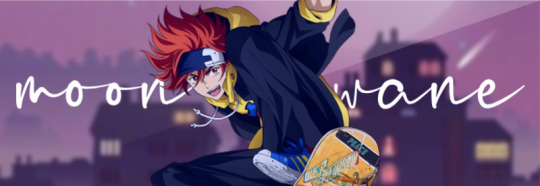
reki's feeling down and you comfort him.
pairing: reki x gn!reader
warnings: sad reki :(
notes: hi
gift for: @hpalways
Reki was acting strangely today.
Actually, he’s been strange for the past week. Week! Why a week? Uh, you weren’t sure.
You wondered if he was possessed. Kyan Reki, a literal skateboarding-fanatic, had suddenly stopped skateboarding to school. Was this what parents called a phase?! An era, even?
He was unenthusiastic, and even when you offered to go skating with him, he declined and said he was busy.
Busy doing what? You munched on an apple angrily. Sure, you didn’t confess to Reki yet. And suuure, you had no idea if he liked you back or even cared about your feelings, but—!
“[Name].”
Okay, honestly, you didn’t even know if Reki was into you. His love for skateboarding probably overpowered any inch of… existence… that you had up in his (tiny) brain.
Silence.
And not to mention the fact that the two of you shared like— zero hobbies in common! What does writing and skateboarding allude to? Uh… poetry about a board? Hello?!
“[Name].”
You took another bite out of your apple, questioning the meaning of life and whether the way Reki spared you a glance for approximately 0.628 seconds meant that he was in love with you.
“[Name]!”
You flinched. Looking over to your side, where your ear was getting yelled at, you were met with the sight of Langa…
… Who had a very unamused expression.
“Did you have a fight with Reki?”
You were offended momentarily, taken aback at his sudden question.
“No?”
“You sound unsure.”
“I didn’t talk to him at all!”
“When was the last time you talked to him?”
Are you a therapist? A detective, even? You sweatdropped, unsure of how to answer.
“I don’t know… yesterday?”
Langa looked surprised. What was he expecting? For you to not talk to Reki for weeks? As much as you wished you could do that, Reki, unfortunately, had some kind of magnet around—
“So he’s sad because of another reason.”
“EH?! Are you saying he’d be sad because of me?”
Okay, now you were actually offended. Did Langa think Reki and you had some kind of bad blood? Hello… that’s a Taylor Swift song! Not your relationship!
“I don’t know.” Langa shrugged. You almost wanted to strangle him, but alas, you were not here to kill pretty boys. “He just seems… off.”
He does. You agreed silently. You were so used to a flamboyant and sunshine Reki, it was odd to see him so down in the dumps. In all honesty, you didn’t even want him to be down. You wanted Reki to be happy.
“I’ll go talk to him!” You stood up with newfound determination. Langa, on the other hand, could only watch you with his usual confused deadpan.
“[Name]-chan, do you even know where he is?”
You deflated slightly. If this were a K-Drama, you would’ve known. Ah, what was the title of that one show? Where they have this little alarm in their head when they come close to the one they love? Yeah, that was what you wanted to be. Though, if you were near Reki with that ability, you may have gone mad due to the repetitive alarm of your mind.
“No… I don’t. But I can find him! Just watch me!”
Langa let out a puff of air, mumbling something along the lines of “no thank you.”
A tick mark appeared on your forehead. The Canadian boy was lucky that he was cute, if he wasn’t, he would’ve been six feet (under)!
And then, you ran off. Leaving a very indifferent Langa and a bunch of questions sprouting in your mind.
Usually, you would find Reki somewhere like a skatepark— but obviously, he was possessed or whatever— so he wouldn’t be at such a place.
Your brain then became the size of the galaxy. His house! You made an abrupt turn, running for your bike that was parked before swiftly hopping onto it, pedalling away to the boy’s address.
Okay, actually, you were no stalker. So you had to pull your phone out to get directions… but let’s pretend that you knew based on instincts because of your undying love for the red-haired boy!
Coincidentally enough, there was a silhouette standing right outside the boy’s house. Squinting, you could barely make out the faint hue of crimson, matched with a very unfitting frown.
Reki. You pedalled a bit faster, desperation rocking each time you did. He’s sad? Why? He seemed to be looking quietly down at his skateboard. The scratches on the bottom represented all of his hard work, and yet, he didn’t look proud.
Finding your voice, you called, “Reki!”
You smiled brightly. It contrasted his solemn look as he glanced up at you instantly. Slightly, you could make out his lips curving up. Somehow, it managed to make your heart beat faster.
When Reki frowns (which was very rare), you would smile. If you could, you would give him every single smile that you’ve ever shown. All of them, any of them. You’d smile for him until your lips could not do so anymore.
Because whenever you were sad, he was there for you. It was only fair to do it back to him. If it were nature’s ecosystem, you supposed that Reki would be the rain and sun, giving you time to flourish. And in return? You’d promise to take care of this grand Earth while he cultivated it.
When did I suddenly become a poet? Your hands subconsciously braked, you suppose it was muscle memory. Docking the bike before hopping off, you walked slowly up to the boy with a small grin.
“[Name].” He seemed relieved when he saw you, and for a moment, it made your hopes fly high. It felt good to know that you were not the only one who was ecstatic over such a brief meeting.
“Want to walk around the town? There’s a new boba place that opened up! We should go together.” You decided to take his mind off of whatever was bothering him. You were no therapist, per se, but it was a start.
And surprisingly, Reki accepted your offer. Weirdly enough, he turned around to his porch before dropping off his skateboard. It confused you a bit— no, tremendously.
Deciding that the sport was the source of his worries, you decided not to pry. I’ll ask later.
With a warm face and a racing heart, the two of you walked off in the direction of the shop. It was odd not biking and him skateboarding, but a change of pace was nice every now and then.
“Hey, [Name]...” Reki kicked a pebble. You almost felt bad for the tiny rock. “Have you ever fallen behind in something you loved?’
Your eyes widened before your mind drifted off. Many times, actually. You were not invincible or a character that was protected heavily by plot-armor— you were just you… kind of average, kind of dumb, but at the end of the day, failure was common, wasn’t it?
“Yeah,” your voice quieted down, and for a second, Reki panicked.
“Sorry! Was that too blunt—?! I’m really sorry!”
You smiled.
“Don’t worry about it, Reki.” You could feel your face get hot, even under the cool Okinawa breeze.
“Actually, I fall behind a lot.” Looking down at your feet, you kind of wanted to sink into the floor. This is embarrassing! But seeing how distraught Reki was, you supposed that giving up your pride would be worth the smile he’d wear after.
“But everyone has different goals and minds. It’s not fair for me to compare myself to others…” You were tempted to give Reki a look as his lips seemed to be quivering.
“Hey, [Name]...” He spoke, stopping abruptly on the sidewalk. You paused, glancing over at him slowly.
“Can you… l-look away, for a bit?” He stuttered, face somehow turning red even under the dimming light. You wanted to question why, but the expression he had and the way his arm rubbed his eyes was enough of a response.
“Sure.” You turned around, refraining from doing the opposite and holding him while he cried. His sniffles grew louder and louder, even when he was making such an active attempt to dwindle them.
“I… I just…” His breath was shaky as he seemed to choke on his own words. “I don’t know what went wrong… what did I do?”
You did nothing wrong. You stayed silent. The male seemed to not need words of reassurance, instead, he only needed a listener.
“He started after me… b-but now I’m just a n...nobody. He’s so much better than me, in everything, anything.” He cried, sniffles turning into hiccups. Don’t cry. You wanted to turn around, but that would be a violation of his request.
So you stepped back. One, two. Counting, you finally felt a wall of fabric. The image of Reki’s yellow sweater popped up in your mind. Cute, you mused. He still wore it in times like these.
You could feel his breath stifle once your back met his. With the two of you facing away from each other, the warmth from his hoodie flourished like ink in water.
“Why do you skate, Reki?” You gazed at the sky. The moon is pretty tonight. The stars too, but right now, the stars reminded you of tears.
And it was then you realized that Reki was not the sun or the rain. He was the moon. Supportive, bright even in the darkest of times, and hidden. Reki was hidden behind prodigies like Langa and Miya, but even so, he was essential.
What would the sun do without the moon? Who would the sun step back for to lay down the burden of giving light? The sun gives for the moon to take, and the moon takes for the sun to give.
If you had looked, then Reki would probably be crying stars. Constellations would be trickling down his cheeks, and maybe, you could make out polaris with it. He could paint the galaxy with him and himself alone, he could do so much, and yet, he was not the sun.
No, he would never compare to the sun. The sun was a completely different essence in itself. It would be unfair to hold Reki up to Langa and expect them to be the same.
Reki was silent. You supposed that in this trek of inferiority, he had lost that essence— that galaxy. What was the reason he skates for? Why did he spend so many hours getting bruises and scratches?
Why did he do so much and expect so little in return?
“Because it’s fun,” he said confidently. If the moon was the sun, then it’d shine so brightly. If the moon was the sun, then the world would never have time to sleep. There would be no way to see the stars, or the constellations in the sky, or Venus and Mars.
With those three words alone, you could feel Reki’s breath speed up. He turned around, resting his hands gently on your shoulders as you could feel his smile alone.
“It’s fun! Skateboarding is fun! It can be done anywhere, anytime—” His voice cracked due to just having cried, and you swore that fumes escaped his ears. You wanted to laugh slightly at his embarrassment, but decided to be benevolent and stay quiet.
“... and can be done with the ones you love.”
You froze. Love. What a strong word, what a broad word. What is love? What does it entail? How can one person want to devote their entire life to another? It was strange.
But you suppose that love is Reki. He is love, he is someone who you’d think about the second you woke up. Was that cheesy? Yes. But when you were a kid, you used to think that the moon was made out of cheese— so it works out. You were quite the poet, Shakespeare kinnie.
“Is that so?” You pretended to question, but Reki knew that you were just saying that to say it.
Reki was an anomaly. As much as you knew about him, and he knew about you, you never seemed to understand him. If it were anyone else, you were sure that they would not recover from a slump with just three words.
But Reki was not anyone else— he was not a nobody either. Reki was the moon and the definition of love, he was sunshine even though he was unappreciated. He was everything and anything.
It was strange, though. You two were only teenagers, and yet, you could envision a whole future with the red-head. Unrealistic. You wanted to scold yourself, but you couldn’t bring yourself to.
“[Name],” Reki called, and this time, he spun you around. He averted his amber eyes from your own irises, a light pout dusting his lips.
“Do you want to… skateboard with me?”
You sweatdropped. What a weird way to confess. Though, you had just concluded that Reki was an anomaly— so this was not that strange.
“Is that your way of asking me out on a date?” You smirked, but that wasn’t enough to mask the way your eyes widened in shock. You were both idiots, but you supposed that wasn’t a bad thing.
“No— yes! Yeah? Wait—” Reki short-circuited, unsure of his own choice of words. Now, he really was reprimanding himself for being such a dummy.
“Relax.” You patted his shoulder, smirk turning into a goofy smile. “If it is… then I accept.”
“R-Really?!” His mouth hung agape, and you could only deadpan.
“Were you expecting me to say no?”
“Well.. I wasn’t really expecting to get this far!” He managed to laugh, even with tear-stained cheeks and reddened eyes.
“Idiot.”
“Hey!”
#sk8 x reader#sk8 the infinity#skate the infinity#sk8#reki x reader#reki kyan x reader#reki kyan x y/n#reki kyan#sk8 reki#reki#kyan reki x reader#skate the infinity x reader#sk8 the infinity x reader
118 notes
·
View notes
Text
LoSlavery Is Not OUR "Original Sin" The thick lines show majority of African slaves went to Spain’s (they started trans-Atlantic slave trade) Latin American & Caribbean slave colonies, Muslim and African Countries. Few went to colony that became the US

How many times have you heard that slavery was “America’s original sin”? I’m not quite sure what that means, but I think the idea is that slavery was a uniquely horrible thing that defines the United States and will stain whites forever. It’s one of the few things Senate Minority Leader Mitch McConnell and Barack Obama agree on. There are books about it. Here’s a college course at UC Davis called “Slavery: America’s Original Sin: Part 1."
The fact is, there has been slavery in every period of history, and just about everywhere. The Greeks and Romans had it, the ancient Egyptians had it, it’s all over the Bible, the Chinese and the pre-Columbian Indians had it, the Maoris in New Zealand had it, and the Muslims had it in spades. But I have never, ever heard of slavery being anyone else’s “original sin.”
About the only societies that never had slaves were primitivehunter-gatherers. As soon as people have some kind of formal social organization, they start taking slaves.
You’ve heard about slavery and mass human sacrifices of Central and South American Indians, but North American Indians were enslaving each other long before the white man showed up.
Tlingit and Haida Indians, who lived in the Pacific Northwest, went raiding for slaves as far South as California. About one quarter of the population were slaves, and the children of slaves were slaves. During potlatches, or huge ceremonial feasts, the Tlingit would sometimes burn property and kill slaves, just to show how rich they were. What’s a couple of slaves to a guy who lives in a house like this?
When we bought Alaska from the Russians in 1867, Indians were furious when we told them they had to give up their slaves. The Tlingit carved this image of Abraham Lincoln, the emancipator, to try to shame the government into compensating them for slaves.
What were called the Five Civilized Tribes of the American Southeast happily bought black slaves. In 1860, there were 21,000 Cherokee, and they owned 4,000 slaves. And that was just the Cherokee. Many took their slaves with them when they were forced to move West.
Free blacks in the South owned slaves. The fact of having been slaves didn’t stop them from wanting to be slave masters themselves. In 1840, in South Carolina alone, there were 454 free blacks who owned a total of 2,357 slaves. Only about 20 percent of Southern households had even one slave, but 75 percent of the free-black households in South Carolina owned slaves.
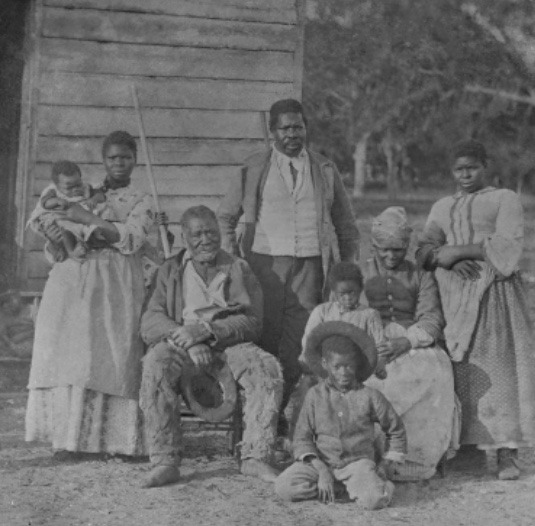

Don’t believe me? It’s all in this book by the expert on the subject, Larry Koger of the University of South Carolina. And he demolishes the idea that most blacks bought slaves only to get family members out of slavery. Like whites, some were kind masters and some were mean, but, for the most part, they owned slaves for exactly the same reasons whites did.

There’s a whole book about this black guy, Andrew Durnford.
He had a plantation of 672 acres along the Mississippi in Louisiana, and close to 100 slaves. Another black slave owner in Louisiana, P.C. Richards, owned 152 slaves. Black slaveowners avidly supported the Confederacy. There are no accurate estimates of the number of slaves held by free blacks at the time of the Civil War, but they would have been tens of thousands.
If slavery is somebody’s Original Sin, it’s sure not ours. Take a look at this map of the slave trade, beginning in 1500.

[Source: SlaveVoyages.com, click to enlarge]
The thicknesses of the lines represent numbers of slaves. What became the United States imported just around 400,000 slaves—about 3 percent of all the slaves who crossed the Atlantic. Look at all the slaves who went to Brazil and to the Caribbean Islands.They needed millions because, unlike American slaveowners who raised slave families, they bought grown men and worked them to death. And let us not forget, virtually every slave on this map was caught by blacks or Arabs.
And look at all the slaves who ended up in North Africa and the Middle East.
That’s millions of them going to Muslim countries at exactly the same time slaves were crossing the Atlantic. And Arabs had been taking black slaves out of Africa, across the Sahara, for 900 years before America was even discovered—and a forced march across the desert was a lot worse than crossing the Atlantic. In this article about Africa’s first slavers—the Arabs—historian Paul Lovejoy estimates that over the centuries, Muslims took about 14 million blacks out of Africa [Recalling Africa’s harrowing tale of its first slavers – The Arabs – as UK Slave Trade Abolition is commemorated, March 27, 2018]. That is more than the 12 million who went to the New World.
And you might ask, where are the descendants of all those Middle Eastern slaves? America has millions of slave descendants. Why don’t you see lots of blacks in Saudi Arabia or Syria or Iraq? Arabs castrated black slaves so they wouldn’t have descendants.

Muslims were even more enthusiastic about enslaving white people. Christian Slaves, Muslim Masters, by Prof. Robert C. Davis is the best book on the subject. Remember the Barbary Pirates of North Africa? Between 1530 and 1780 they caught and enslaved more than a million white, European Christians. During the 16th and 17th centuries, Arabs took more white slaves south across the Mediterranean than there were blacks shipped across the Atlantic.
Mostly, Muslim pirates captured European ships and stole their crews. In just three years, from 1606 to 1609, the British navy admitted it had lost 466 British merchant ships to North African pirates [Counting European Slaves on the Barbary Coast Past & Present, August 2001]. Four hundred sixty-six ships in just three years. Arabs took American slaves. Between 1785 and 1793 Algerians captured 13 American ships in the Mediterranean and enslaved the crews. This is a 1804 battle between Arab pirates and the USS Enterprise.

It was only in 1815, after two wars, that the United States was finally free of the Barbary pirates.
Muslim pirates also organized huge, amphibious slave-catching assaults that practically depopulated the Italian coast. In 1544, Algerian raiders took 7,000 slaves in the Bay of Naples in a single raid. This drove the price of slaves so low it was said you could “swap a Christian for an onion.”
After a 1566 raid on Granada in Spain netted 4,000 men women, and children, it was said to be “raining Christians in Algiers.” Women were easier to catch than men, and were prized as sex slaves, so some coastal areas lost their entire child-bearing populations. One raid as far away as Iceland brought back 400 white slaves.
Prof. Davis notes that the trade in black Africans was strictly business, but Muslims had a jihad-like enthusiasm for stealing Christians. It was revenge for the Crusades and for the reconquest of Spain from the Arabs in 1492. When Muslim corsairs raided Europe, they made a point of desecrating churches and stealing church bells. The metal was valuable but stealing church bells silenced the voice of Christianity.
It was a tradition to parade newly captured Europeans through the streets so people could jeer at them, while children threw garbage at them. At the slave market, both men and women were stripped naked to evaluate their sexual value. In the North African capitals—Tunis, Algiers, Tripoli—there was a big demand for homosexual sex-slaves. Other Europeans were worked to death on farms or building projects.
Prof. Davis writes that unlike in North America, there were no limits on cruelty: “There was no countervailing force to protect the slave from his master’s violence: no local anti-cruelty laws, no benign public opinion, and rarely any effective pressure from foreign states.” Slaves were not just property, they were infidels, and deserved whatever suffering a master meted out.
For a man, there was a fate even worse than being a sex slave. Hundreds of thousands became galley slaves, often on slave-catching pirate ships. They were chained to their oars 24 hours a day, and could move only to the hole where the oar went through the hull—so they could relieve themselves. If the men were rowing, they fouled themselves. Galley slaves lived in a horrible stench, ate rotten food, were whipped by slave drivers and tormented by rats and lice. They could not lie down and had to sleep at their oars. Many never left their ships, even in port. Their job was to row until they died, and to be tossed overboard at the first sign of weakness.
Muslims have taken slaves for as long as there have been Muslims, which is about 1,400 years.

Mohammed himself was an enthusiastic slave trader. Muslims still take black slaves. As this article points out, Libya still has slave markets, Mauritanian Arabs take black slaves, and there is still slavery in Niger, Mali, Chad and Sudan[Libya’s slave markets are a reminder that the exploitation of Africans never went away, by Martin Plaut, New Statesman, February 21, 2018].
And, of course, it was white people who abolished slavery, both in their own countries and, except for a few stubborn holdouts, the whole world. Africans, just like the Tlingit Indians, screamed about all the wealth we made them give up.
But slavery’s still our “original sin.” As Time magazine wrote just this month about slavery “Europeans and their colonial “descendants” in the United States engineered the most complete and enduring dehumanization of a people in history."[Facing America's History of Racism Requires Facing the Origins of 'Race' as a Concept, by Andrew Curran, July 10, 2020]
What a small minority of Americans did for 246 years—and in a relatively mild form—is worse than anything that was ever done anywhere by anyone.
That, ladies and gentlemen, is the power of white privilege. I hope you are enjoying it. Watch this video:
youtube
51 notes
·
View notes